




Food. It’s like a warm hug that embraces us. It’s a gesture of love that comforts and connects us with friends and family while sharing good conversations and good times. So whether it’s sitting down to a holiday feast, grabbing lunch with a colleague or picking up your morning coffee, food truly brings people together.
From farm to plate, we’re creating healthy and nutritious food using sustainably sourced ingredients while continuing to reduce waste and greenhouse gas (GHG) emissions. We come together – across locations, kitchens and communities – as Canada’s leading foodservice provider to do our part in making the world a better place to live, love and eat.
Compass Group Canada is proud to present our 2023 Sustainability Report. This report refers to Compass Group Canada and its subsidiaries, which are part of Compass Group PLC.
This report is guided by our three sustainability pillars outlined on page 6. It details our sustainability journey over the years and highlights our key successes in 2023. The reporting period covers the calendar year ending September 29, 2023, and all financial figures are in Canadian dollars unless otherwise specified.
Based on the outcomes of Compass Group’s materiality assessment conducted in 2021, we aligned our strategy with the United Nations Sustainable Development Goals (SDGs). We then summarized how we can best contribute to the SDGs, identifying where we have the responsibility to act and the greatest opportunity to have an impact on society and the environment, including our commitment to reducing global GHG emissions. Our materiality assessment guided the development of our Planet Promise commitments and targets as outlined on page 6.
All data from Social Finance Inc. (SoFi) has been audited independently by EcoAct Climate Consultancy. The remaining data and content in this report have not been externally assured.
For comments or additional information, get in touch with Compass Group Canada’s sustainability team at cgc.sustainability@compass-canada.com.
Our policies provide a foundation for our business operations and the guidelines under which we operate. Visit our website to access our policies, including those related to privacy and our Modern Slavery Act Statement.


We acknowledge that the Compass Group Canada head office is located on the traditional lands of the Haudenosaunee, Anishinaabe and the Mississaugas of the Credit First Nations Peoples.
Given that we operate in different areas across the land, we would like to extend this Land Acknowledgement to all of Turtle Island. We acknowledge the ancestral and unceded territory of the Inuit, Métis and First Nations Peoples.
We are committed to deepening our understanding of Indigenous Peoples, their histories and lived realities as we focus on working together toward reconciliation. We are dedicated to strengthening our relationships with Indigenous communities by focusing our efforts on learning truths and unlearning falsehoods, honouring those who came before us and protecting generations to come.
Compass is Canada’s leading foodservice and support services provider. We have more than 25,000 associates working in over 2,100 locations nationwide. At Compass, we specialize in providing foodservice and support services that cater to each client’s individual and unique needs. Compass works across several business sectors, including leading sports and leisure venues, executive dining rooms and cafés, schools, universities, seniors’ residences and hospitals. We also provide services at remote sites across the country.
Our mission, vision and values capture the spirit of Compass Group and what we stand for. They guide our people’s decisions, actions and behaviours; are evidenced in our customers’ experience of the service we deliver every day globally; and drive our performance and growth.
Everyone at Compass is committed to consistently delivering superior service in the most engaging way, for the shared benefit of our customers, shareholders and associates.
To be a world-class provider of contract foodservice and support services, renowned for our great people, our great service and our great results.
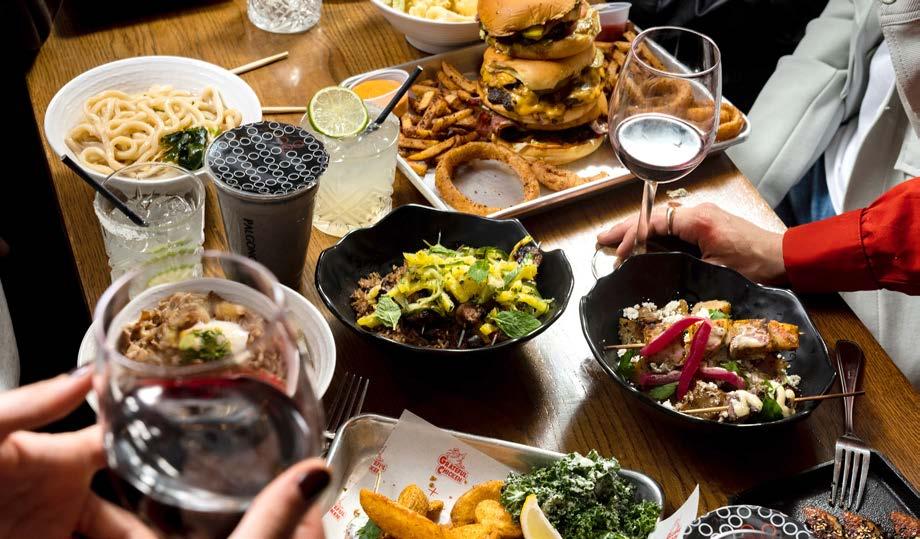
At Compass, we admit to being a little obsessed with our culture. We care deeply about creating an inclusive environment for every Compass associate and providing each one with an opportunity to develop, learn and succeed. We are proud of the workplace culture we’ve built, and our awards and recognition are proof of the positive impact of our efforts.
We embrace the tremendous power of food and the opportunity we have to positively impact the lives of our guests, our associates and our communities – on both a local and global level. Nothing is more important than keeping people safe and healthy. We take our responsibility seriously when it comes to taking care of people and the planet – making sure our business supports healthy people and a healthy planet.
We deliver world-class service by putting our people first and leading through our purpose. We accelerate our company’s growth by providing advancement opportunities to our people, and our progress is driven by the shared belief that Compass can deliver the best service while making the greatest impact on the world.
This means being our authentic selves. We are grounded in who we are and in our interactions, and we are transparent in the relationships we build. We are trusted by the people we lead, support and serve, and we strive to connect to others in authentic, deep and meaningful ways.
We inspire others to be great by leading with confidence. We are confident in who we are, what we know and our ability to get things done. We are committed to excellence in everything we do while being open to new ideas and embracing experimentation.
We are not afraid to think bolder, bigger and braver and lean into the feeling of ambiguity without being paralyzed by it. We support others in moving forward with confidence and conviction in the face of change. When faced with disappointment or adversity, we stay resilient, learn from the experience and march forth.
We are driven. We are built to move things forward and overcome obstacles. We never lose focus on our objective, and we fully commit to seizing the initiative. We are obsessed with growth – working at a pace that accelerates the pulse of our people, our teams and the organization while striving to deliver sustainable performance.
We are foodies serving foodies.
We are keenly focused on food. It’s our passion and our raison d’être. We are committed to preparing the best possible meals using the freshest, most delicious, wholesome ingredients. And because sustainability is always top of mind, we actively source locally and seasonally, ensuring we meet the unique needs of our customers and clients while considering what is good for the planet. Since we love food, we can’t stand to waste it. So, it makes sense that we care deeply about the environmental impact we can have in reducing our own food waste and encouraging our communities to do the same.
Put simply, Scope 1 emissions are emissions that are directly controlled by a company – for example, the amount of fuel used to power fleet vehicles that aren’t electric. Scope 2 and 3 emissions are considered indirect emissions because they are from sources not directly controlled by a company. An example of Scope 2 emissions would be emissions from a building’s electrical supply. Scope 3 emissions are those created by a company’s value chain, including products that are bought and used by a company and its consumers and then disposed of by an outside supplier.
Knowing what matters most to our stakeholders is essential to us, and, in many cases, helps us identify how and where our business measures, manages and evaluates its impact on the planet. Underpinned by our ongoing commitment to safety and people, our Planet Promise strategy focuses on three key pillars through which we know we can make the greatest impact:
Staying healthy in both mind and body is important for longevity and overall good health. We continue to focus on providing better nutritional choices and supporting mental health and well-being through various initiatives.
We are taking action to address our impact on the planet, including reducing food waste, eliminating single-use plastic packaging and increasing plant-based options in our menus.
We are creating a more resilient supply chain by focusing on responsible and sustainable sourcing, enriching the local communities in which we operate and collaborating with external partners to maximize our positive impact.
Compass is the first international company in the contract catering industry to set a global commitment to achieve net zero emissions by 2050.
The food industry has a significant role to play in reaching net zero, and we are committed to playing our part in driving the transition to a healthy and sustainable global food system.
That’s why Compass is dedicated to reaching Climate Net Zero GHG emissions across our global operations and value chain by 2050.
We developed our Global Net Zero strategy in partnership with international climate consultancy South Pole. It includes ambitious carbon emissions reductions to reach targets by 2030, validated by the Science Based Targets initiative (SBTi).
• Reduce our absolute Scope 1 and 2 GHG emissions by 46% by 2030, from a 2019 base year, in line with an ambition to limit future warming to 1.5°C above pre-industrial levels.
• Reduce our absolute Scope 3 GHG emissions from all food and drink purchased by 28% by 2030, from a 2019 base year, in line with a scenario well below 2°C.
• Achieve carbon neutrality worldwide in our Compass Group operations by 2030 (Scope 1 and 2).
• Achieve Climate Net Zero across our global value chain by 2050.
At Compass Group Canada, we are proud to be a leader in sustainability. Our purpose is clear –we have a responsibility to our people, our clients, our guests, our communities and our planet.
As Canada’s leading food and support services company, we operate in thousands of facilities across our country, employ over 25,000 people and serve hundreds of millions of meals every year. This scale gives us a unique opportunity to truly make a meaningful difference but, even more so, it comes with the accountability to do the right thing.
As an organization, we will be remembered for the way we conducted business and the impact we left behind. The decisions we make today will impact our world for generations to come – we know we need to do more, and more importantly, our planet needs us to do better. That’s why it is one of my personal priorities to provide my unwavering support to our sustainability efforts and achieve our goal of leaving the world better than we found it.
In the past year, we have taken significant steps forward in our sustainability journey through a number of important initiatives and exciting innovations as we work toward achieving our Planet Promise and Canadian Climate Commitment – which you will learn more about later in this report.
While there is still much work to be done, I am thrilled to see meaningful change taking place within our organization. We know that the actions we take, no matter how large or small, play a role in making a real change, so we started by asking ourselves – how can we make a difference? For us, the answer lies in making the RIGHT thing to do, the EASY thing to do. We want to make it easy for people to make good decisions by offering innovative solutions and sustainable opportunities – that’s how we will see real change.
And we know we can do this by working together. By creating “days of action” such as our annual Stop Food Waste Day, where our chefs from around the world make it a priority to promote our best practices for reducing food waste. By encouraging mentorship and prioritizing leadership to challenge ourselves to continue learning, growing and innovating. By offering sustainable and safe support services and delicious and nutritious food that prioritizes quality, taste, presentation and sustainably sourced ingredients.
Thank you for joining us on our sustainability journey. With your support, I know we will make a true and meaningful impact, together.
Sincerely,
 Saajid Khan Chief Executive Officer, Compass Group Canada & ESS North America
Saajid Khan Chief Executive Officer, Compass Group Canada & ESS North America

As an organization, we will be remembered for the way we conducted business and the impact we left behind. The decisions we make today will impact our world for generations to come – we know we need to do more, and more importantly, our planet needs us to do better.”
The art of preparing a meal for people to enjoy together is a passion that has driven and inspired my career as a chef. It is this passion that has helped steer my path, discovering the right kitchens and organizations to work, create and grow within.
Since joining Compass Group Canada, I have felt joy in feeding people from different walks of life, and I’ve also been given an opportunity to develop my dedication to doing what’s good for the planet. By focusing not only on delicious food but also on the significant impact certain choices can have on our planet, building sustainable menus has transformed my love of food into a commitment to culinary innovation and environmental responsibility.
I am proud to say that Compass is recognized as a forerunner, not only for our delicious dishes but also for our unwavering commitment to sustainability. As a culinary leader, I can confirm that sustainability is more than just a buzzword here; it’s a way of life.
One of our core values that has resonated with me is to always meet the needs of our operations teams. However – this has never come at the cost of protecting our planet’s future. The decisions we make are guided by a profound sense of sustainable stewardship.
We understand that our culinary choices have far-reaching implications, and we take our responsibility to the environment, the
communities we serve and the health of our clients seriously. In essence, we view sustainability as a vital ingredient in our recipe for success. As a food company, quality is non-negotiable in our decision-making process. As we build environmentally friendly practices, we do so without compromising taste or presentation. In fact, we believe that high-quality ingredients are the building blocks of exceptional cuisine. When guests dine with us, they can trust that they are enjoying a delicious meal that reflects our commitment to culinary excellence as well as sustainability.
With the support of our purchasing partners in Foodbuy, we prioritize local and seasonal ingredients. This supports local farmers, reduces food miles and ensures that our dishes are fresh and of the highest quality. We work closely with local suppliers to build long-term relationships that benefit everyone involved. Sustainability isn’t just about what’s on the plate; it’s also about the journey ingredients take to reach it.
Chefs are trained to be creative and efficient. We minimize food waste by using every part of an ingredient. Compass continues to be an innovative leader through multiple food waste initiatives, including our proprietary food waste system called Waste Not 2.0, our annual Stop Food Waste Day campaign and ongoing recycling and composting programs – all to help make sure nothing usable goes to waste.
Menu engineering for sustainability involves a thoughtful integration of plant-based recipes and ingredients to craft eco-conscious menus. By strategically incorporating a diverse range of vegetables, legumes, grains and plantbased proteins, we are reducing our carbon footprint and promoting healthier, cruelty-free dining options. By emphasizing plant-based ingredients, establishments can contribute to a more environmentally responsible and health-conscious culinary landscape while also appealing to more customers.
We will continue to source our ingredients thoughtfully, reduce waste diligently and operate our kitchens efficiently. Our commitment to sustainability is unwavering.
Compass is not just a place to enjoy outstanding food; it’s a place where our chefs create a brighter and greener future for all.
Chef André Blanchet
Sr. Director, Culinary, Compass Group Canada
We understand that our culinary choices have far-reaching implications, and we take our responsibility to the environment, the communities we serve and the health of our clients seriously. In essence, we view sustainability as a vital ingredient in our recipe for success.”

Sustainability doesn’t just happen. It takes planning, commitment and consistency. Above all else, it takes time to find the right business model that works for the long term. It takes careful course correction along the way and diligent monitoring of each step on the path toward our goals. It has been and will continue to be a journey of discovery for us as we work toward net zero.
To be seen and recognized as a sustainability leader, you need to be talking about your story and doing that in a really authentic way. It’s not just about putting out a press release and some social media saying, ‘Hey, look at these great things we’ve done,’ but truly being at the table and contributing to these multi-stakeholder organizations and groups and conversations to help drive progress.”
– Jennifer Lambert, Director, Sustainability, Compass Group CanadaResearch has shown that Canadians want to purchase from, and work for, companies that align with their personal values. Whether they’re supporting local farmers and producers, reducing food and package waste or battling food security, Canadians expect large organizations to lead the charge in sustainability, and they seek out employment with companies who align with their individual values. I’m proud to have worked over 20 years for an organization that is committed to leading the charge for sustainability.”
– Kelly Contreras, Director, Sustainability & Consumer Insights, Compass Group Canada
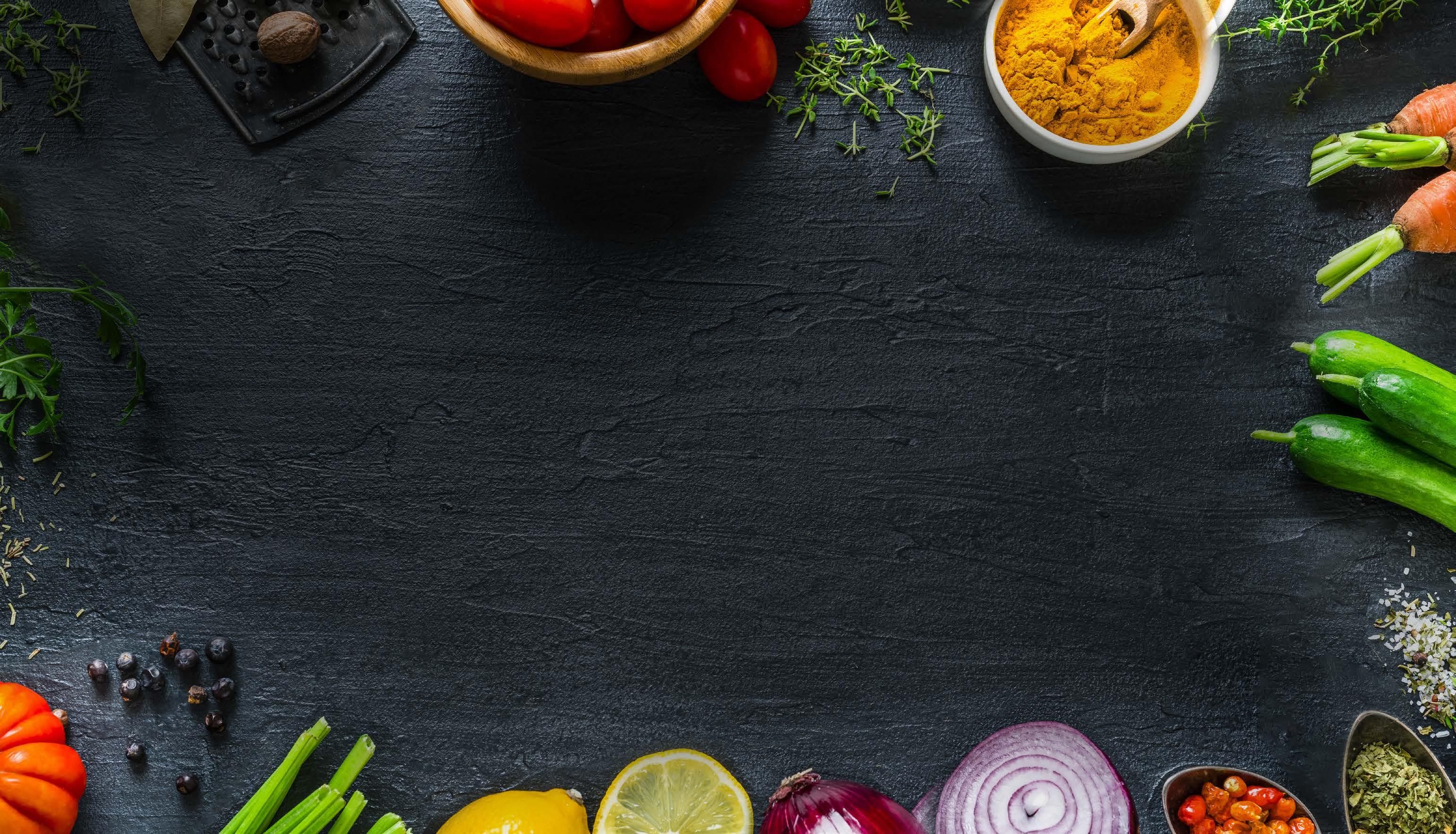
2012/2013
May 12, 2012 – Simon Fraser University is the first campus in Canada with food operations managed by a third-party operator to be designated as a Fair Trade Campus by Fairtrade Canada
October 5, 2013 – First fair trade Starbucks store in Canada opens, managed by Chartwells at Simon Fraser University
2015
10,000+ associates complete Compass Group Canada’s Sustainability Training certification
2017
Stop Food Waste Day launches –becoming the largest single day of action in the fight against food waste
2021
Compass Group Canada partners with the Athabasca Chipewyan First Nation to provide a farm and training to the Indigenous community through our exclusive partnership with the Growcer
2022
Compass Group issues first sustainable bonds to support net zero ambitions
2021
October – Compass Group becomes the first international company in the contract catering industry to announce a global commitment to a 2050 net zero emissions economy
2019
March 13 – Compass Group Canada launches its Buy Local program, connecting local farmers and businesses to Compass chefs and managers
Since 2018, Compass Group Canada has made $1.8 million in food donations through Second Harvest, supporting those in need CO2
2023
July – Compass Group
Canada participates in the Food and Agriculture Organization (FAO) UN Conference in Rome, Italy
2023
August – Compass Group
Canada Chef André Blanchet joins the Global Culinary Forum
2023
We are incredibly proud of the valuable and vital work this team takes on under its collective wings and its dedication to helping us reach our milestones and achieve our goals.
 Heather Wilkie Executive Vice President, Business Transformation
Heather Wilkie Executive Vice President, Business Transformation

Our highly skilled team leverages best-in-class market research to bring our hospitality vision to life through innovative, customized offers combined with leading sustainable solutions. We focus on:
Linking Sustainability to Innovation
We know that to reach our sustainability goals, we must innovate. So, we made a conscious decision to place sustainability and innovation on the same team.
Integrating Sustainability Into Our Technology Platforms
We leverage technology to create great guest experiences and drive positive change to make a meaningful impact on communities across Canada. Using technology to reduce food waste and our carbon footprint simply makes sense.
Project- and Change-Management Support
Project management is essential for ensuring we deliver projects within scope, on time and on budget. Change management is a key focal point for us to ensure that the right changes stick. With sustainability, we’re doing everything possible to make the RIGHT thing to do, the EASY thing to do.
Jennifer Lambert Director, Sustainability
Our Canadian corporate sustainability team focuses on three main areas of support:
We provide a dedicated resource for our clients and operators, ensuring that we maintain focus on the needs of our operations teams, clients and customers. This role assists our sales and client support teams and works directly with operations to understand our client sustainability objectives and how we can move toward our common goals.
We continue to pilot and test new sustainability innovations to provide our clients with leading-edge technologies. Our team builds relationships with suppliers, industry partners and non-profit organizations to deliver best-inclass sustainability programs.
A key focus for our team is building sustainability knowledge across our organization and showcasing our achievements externally. We build and deliver sustainability training programs, including online courses, guides and other resources. We work closely with our marketing teams to develop exciting new content that educates our customers about our sustainability programs. We also collaborate with our communications team to share stories of our successes.
Kelly Contreras Director, Sustainability & Consumer InsightsOur Sustainability and Consumer Insights team leverages data and insights in support of three key areas:
Our sustainability strategy aligns with our Planet Promise goals, with reporting playing a fundamental role in disclosing progress toward our global commitments in a transparent manner. The results of our ESG reporting allow us to stay on track toward our 2030 milestones on our journey to becoming net zero in 2050. Results are released annually for investors, clients, suppliers, associates and other stakeholders.
We upload our ESG data to our Group platform, SpheraCloud, our corporate sustainability software provider, where the data is reviewed, independently audited and verified.
We seek to understand the role sustainability plays in Canadian consumers’ purchasing decisions and behaviours, then identify the sustainability initiatives and programs that best align with those values. This informs the strategy of our internal programs, such as plant-based culinary offers, community engagement events and more.
Internal Program Reporting
Internal program reporting includes our key focus areas such as food waste reduction, reusable packaging and other important initiatives. This reporting helps us establish benchmarks and KPIs and set goals. It also provides visibility to our leadership and clients, ensuring they can track and measure program performance and results, driving compliance and impact across the business.
Our sustainability strategy is focused on supporting nine of the 17 SDGs where we believe we can make the greatest contribution, including where we know we can make significant inroads in reducing GHG emissions. These commitments include acting around carbon, animal welfare and food waste.
We help our local communities tackle food insecurity by donating surplus food to the people in need through partnerships with local charities and organizations.
We work with our clients to help consumers make informed and healthier meal choices by adding more healthy menu items and reformulating recipes.
We empower women to work with Compass Group by investing in our female colleagues through development and training programs, as well as encouraging women-led suppliers.
Our people are crucial to our business success and are our most important asset. We work with local communities across the globe to offer fair and safe employment and promising career opportunities.
We are committed to reducing our food waste by 50% by 2030 and are actively working in every region to implement relevant measures. We also use environmental management systems along with education and toolkits to help reduce waste through prevention, recycling and reuse.
We have ambitious climate-related targets with our Global Net Zero 2050 commitment, and a further commitment to be carbon neutral worldwide in our own operations (Scope 1 and 2) by 2030, which have been validated by the SBTi.
Our priority is to reduce packaging without compromising food safety and freshness and to work with our packaging suppliers to fast-track sustainable alternatives to single-use and fossil fuel-based plastics.
We are working to deliver a global deforestation-free and land conversionfree supply chain strategy, which we aim to achieve through the increased use of sustainable products sourced globally and by reviewing and taking action on additional high-risk commodities.
To help address some of the biggest global challenges, as a responsible business we understand the importance of partnering with our clients, suppliers, non-governmental organizations (NGOs) and other stakeholders to improve our impact.
In 2023, we refreshed our view on materiality. In addition to helping us understand potential financial risks and opportunities related to a wide range of ESG topics, this assessment also helped Compass further understand how our actions impact the planet and society. The process involved a wide range of internal and external stakeholders from across all of our operating regions. External stakeholders included consumers, suppliers, distributors, NGOs, investors and topic-specific subject matter experts.
The outputs are mostly a refinement of the topics highlighted in our previous materiality assessment, though the process helped Compass develop a much deeper understanding of the impact we can have as an organization. This knowledge will be used to further refine our strategies and ensure we focus our efforts on the initiatives that matter the most.
ESG Topic
Climate change adaptation and mitigation
Nature and biodiversity
Environment
Waste
Inclusive talent attraction and retention
Health, safety and well-being
Workers’ rights
Workers in our value chain
Food transparency
Social
Sustainable and healthy diets
Food safety
Business ethics and integrity
Bribery and corruption
Cybersecurity, privacy and data security
Compass Group’s Actions
Taking action to reduce Compass Group’s direct and indirect GHG emissions (Scope 1, 2 and 3) and adapting the supply chain to be resilient to the effects of climate change.
Establishing policies, standards and programs to minimize the impact of sourcing on natural ecosystems, including preventing deforestation, overfishing and biodiversity loss.
Reducing food waste throughout our value chain, from source to kitchen, and reducing the amount of plastic packaging used in operations and, where possible, investing in sustainable alternatives.
Creating an environment in which our people thrive and feel valued, and building a diverse, equitable and inclusive workforce to reflect the communities in which we operate. This includes ensuring fair working conditions and adequate wages.
Fostering a culture of health, safety and well-being throughout Compass Group’s operations.
Committing to upholding human rights, and always treating people fairly, with dignity and respect, within the businesses’ operations.
Advancing ethical principles, human rights and labour standards in Compass Group’s supply chain.
Presenting consumers with accurate product information and ensuring that any product claims can be substantiated.
Offering sustainable and quality ingredients and healthy recipes that appeal to consumers across Compass Group’s businesses.
Promoting a culture of food safety throughout Compass Group’s businesses to guide the decisions, actions and behaviours of our people.
Implementing the Code of Business Conduct (CBC) and other Group Policies (including the Business Integrity Policy), reinforced by Compass Group’s global Ethics and Integrity (E&I) program.
Upholding a strong culture of integrity, promoted through the E&I program and its independently operated Speak Up, We’re Listening helpline and web platform. Focusing on preventing, detecting and responding to emerging risks and incidents, and providing mandatory training and awareness programs.
Assessing cyber risk and monitoring and managing the maturity of Compass Group’s enterprise infrastructure, platforms and security controls. Ensuring appropriate crisis management procedures are in place and implementing principle-based rules for the use of artificial intelligence.

Chartwells Canada, a Compass Group Canada company and the country’s leading educational foodservice provider, participated in the United Nations Food Systems Summit +2 Stocktaking Moment in Rome, Italy, in July 2023. In partnership with Simon Fraser University (SFU), where Chartwells is the on-campus foodservice provider, the Canadian contingent participated in the summit to showcase its successful local food-sourcing model, which has resulted in 40% of the food at the university campus being sourced locally from B.C.
Together, Chartwells and SFU demonstrated a strong commitment toward sustainable consumption and production through several initiatives, including:
• Setting a stretch goal of 50% local food sourcing at SFU
• Promoting the Farm to Fork program at SFU to share information with students about new local farmers
• Achieving Leadership in Energy and Environmental Design (LEED) Gold certification at the SFU Dining Commons (LEED certification is a globally recognized symbol of sustainability achievement in building design)
• Using “Spotlight” opportunities to highlight local vendors and their products through inclusion in weekly menu items and on-campus activities
• Reducing the use of single-use plastics on campus by banning all single-use plastic beverage bottles and providing single-use plastic-free catering
• Creating a variety of programs to combat food insecurity among students, including the Connecting Through Food campaign, hosted by Chartwells in 2023
• Piloting programs on campus aimed at minimizing food waste
Our research has shown that 75% of Canadians are more likely to purchase food that is locally sourced. We’ve made local food a priority in our service because it’s what our guests are looking for and because it’s the right thing to do.”
As leaders, we all play a role in creating a sustainable food system, both at home and globally.”
As a company that serves 45 million meals to over 1.2 million post-secondary students a year, we understand that our actions have a unique opportunity to have meaningful impact at scale in Canada. We’re excited to have had the opportunity to share the success of our local food partnership with SFU at the UN Food Systems Summit +2 Stocktaking Moment and hope it inspires similar change globally.”
– Kevin Booth, Executive Vice President, Chartwells Canada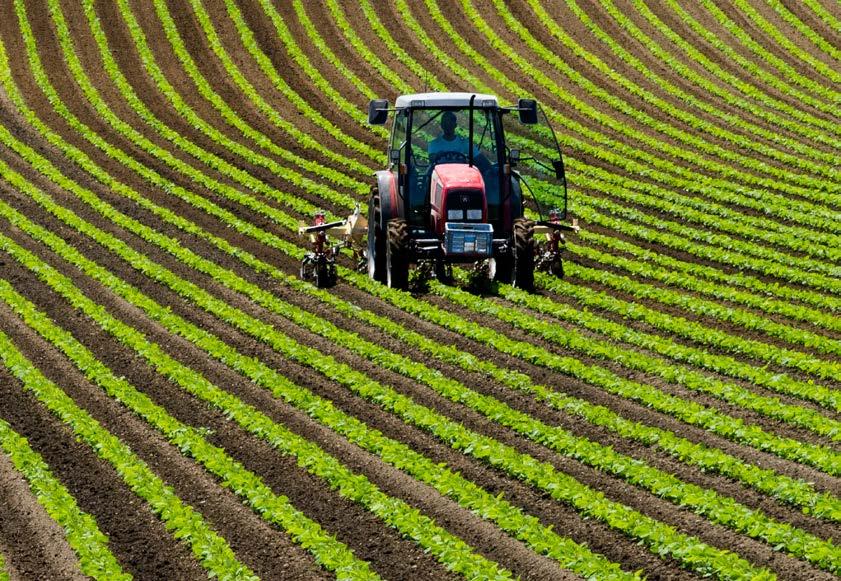

5. Consumers
Our meals are consumed on-site or packaged for takeout. We constantly work to meet consumer demand for nutritious and sustainable food options.
1. Agriculture and Farmers
The raw ingredients that are grown, gathered, reared or fished for our kitchens. We aim to increase the resiliency of our supply chain and support our communities by sourcing locally.
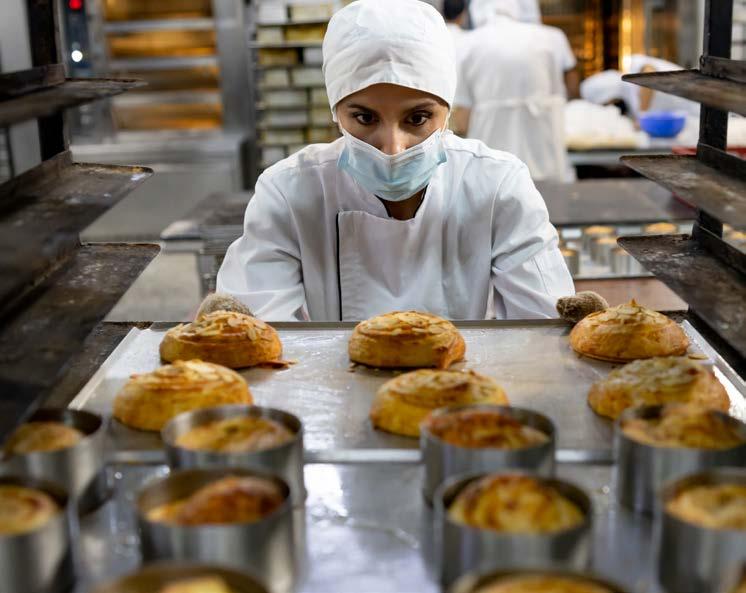
2. Processing and Packing
Some raw ingredients require processing, refining or transforming to create a product suitable for both distribution and consumption.
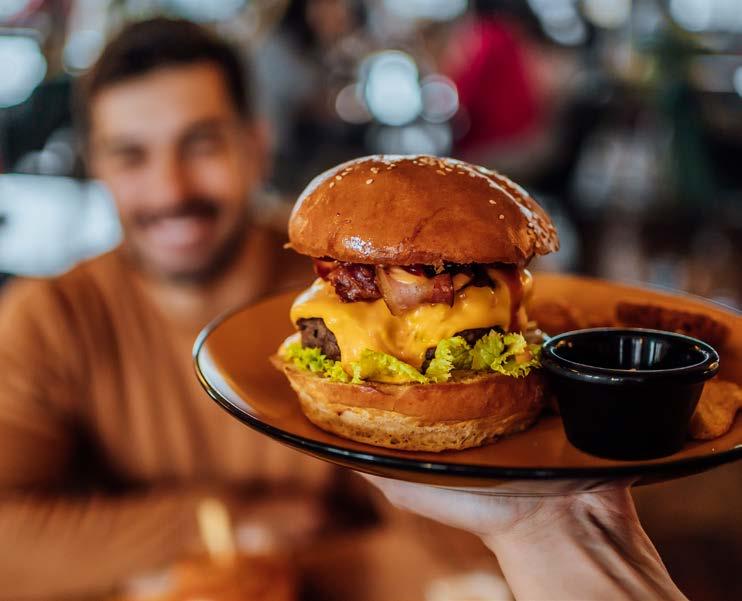
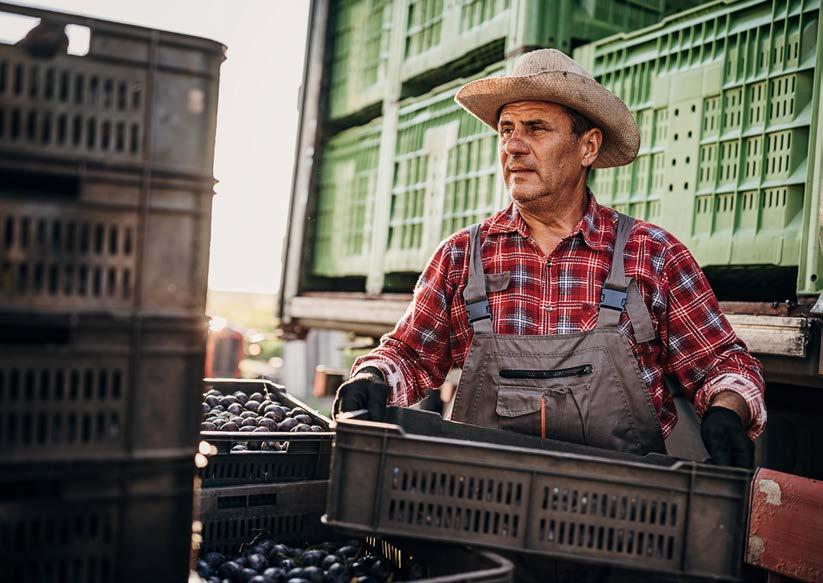
4. Foodservice
We prepare, cook and serve all food and drink at our client sites. In addition to providing safe, nutritious and delicious food, we aim to minimize food waste while reducing the use of single-use plastic packaging.
3. Distribution and Logistics
This step transports products to distribution centres before being shipped to individual sites. Our goal is to reduce the distance food travels from the warehouse to the kitchen.
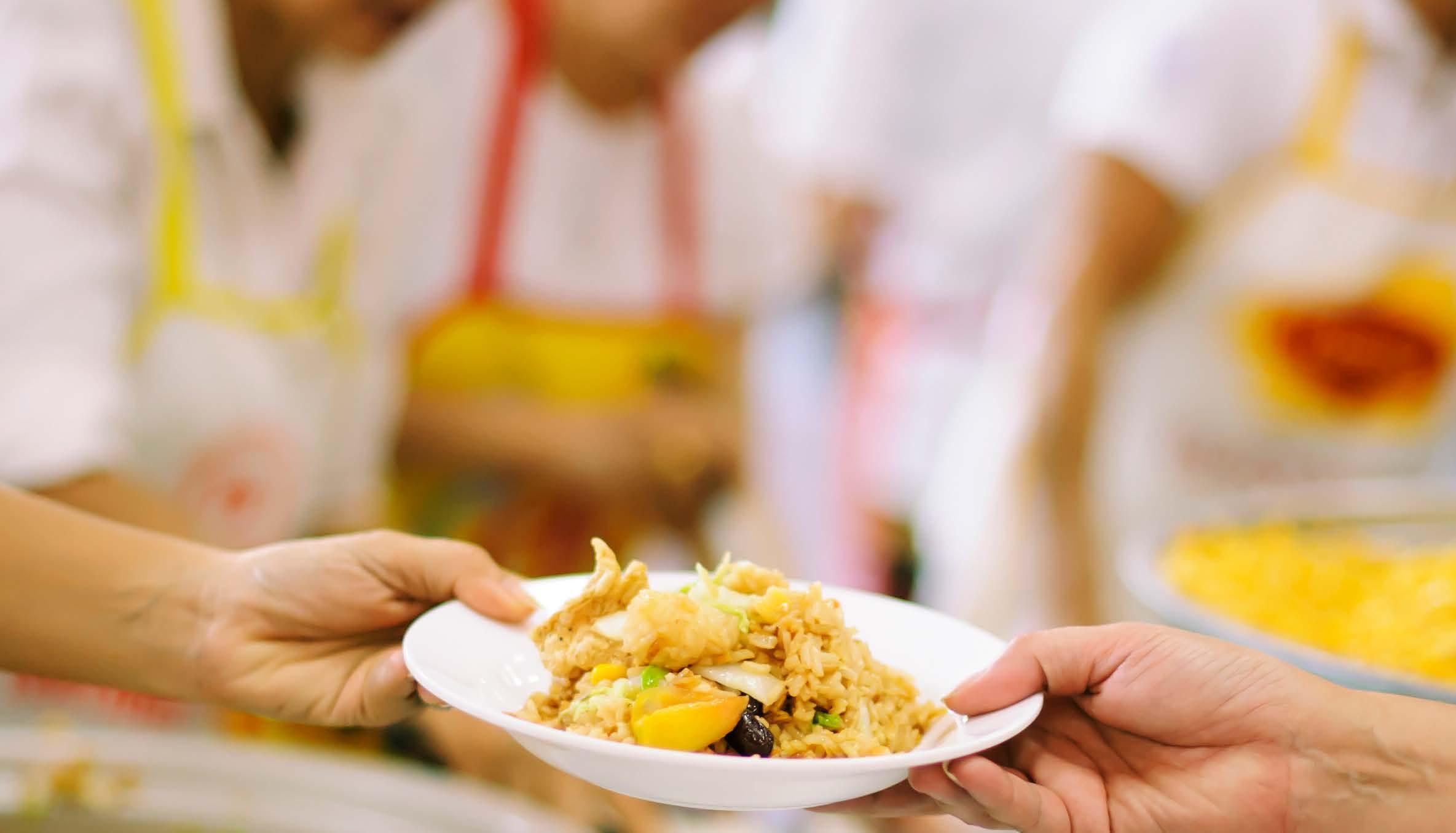
FOOD WASTE REDUCTION
120
Waste Not 2.0 units launched
21.9 tonnes of food sent to compost
DONATED MEALS
276,618 meals donated
276,618 meals donated
244,604 kg of GHG emissions diverted CO2
244,604 kilograms of GHG emissions diverted
120 non-profits supported
120 non-prof its supported
50+ communities supported across Canada
96,649 responses received from guests
SINGLE-USE CONTAINERS
136,061 single-use containers diverted from landfill
931,128 litres of water saved

How will 2030 targets help Compass Group Canada attain net zero by 2050?
To mitigate the impacts of climate change, we must take action to keep global warming to no more than 1.5°C above pre-industrial levels, as called for in the Paris Agreement. Our commitment to achieve net zero emissions by 2050 takes us on a multi-year journey, but it is critical to take immediate action to make the most meaningful impact. Setting near-term targets allows us to focus on addressing our largest emission sources with urgency while not losing focus on making progress on longer-term goals. This is a major transition and it is going to require collaboration with many stakeholders. Having a clear path will help guide us and ensure we can clearly communicate our goals and achievements.

To make our Climate Net Zero ambitions a reality, the actions we take over the next decade will be crucial. Which is why we have committed to:
To make our Climate Net Zero ambitions a reality, the actions we take over the next decade will be crucial. Which is why we have committed to:
Approved Science based targets to 2030
Carbon neutrality in our operations by 2030 (Scope 1 & 2)
Estimated emissions with no action
Climate Net Zero by 2050 across our value chain
• Collaborate with clients on decarbonisation
• Use more seasonal and locally sourced produce
• Increase proportion of plant-based products in menus
Our 2030 Targets:
• Collaborate with clients on decarbonization
• Use more seasonal and locally sourced produce
• Increase proportion of plant-based products in menus
Our 2030 Targets:
46% reduction in Scope 1 & 2 direct emissions*
28% reduction in our Scope 3 emissions associated with the food & drink we buy
46 % reduction in Scope 1 and 2 direct emissions*
50% reduction in food waste
• Educate and inform consumers to make more sustainable choices
28% reduction in our Scope 3 emissions associated with the food and drink we buy
50% reduction in food waste
• Transition global fleet vehicles to 100% plug-in electric
• Educate and inform consumers to make more sustainable choices
• Switch to renewable electricity across our controlled operations
• Invest in decarbonisation projects that accelerate Net Zero innovation
• Increase sourcing from regenerative agriculture across all key food product categories
• Transition global fleet vehicles to 100% plug-in electric
• Switch to renewable electricity across our controlled operations
• Invest in decarbonization projects that accelerate net zero innovation
• Increase sourcing from regenerative agriculture across all key food product categories
• Deliver a global deforestation-free and land conversion-free supply chain strategy
• Work with suppliers to set their own Climate Net Zero and Science Based Targets
• Share best practice from early adopter countries to drive accelerated transformation globally
• Use our global scale and reach to drive sustainable consumption practices up and down our value chain
• Deliver a global deforestation-free and land conversion-free supply chain strategy
• Work with suppliers to set their own Climate Net Zero and science-based targets
• Share best practice from early adopter countries to drive accelerated transformation globally
• Use our global scale and reach to drive sustainable consumption practices up and down our value chain




Net Zero by 2050
*

Carbon
We have started monitoring, reporting on and reducing our Scope 1 emissions. As part of our commitment to reduce GHGs, we are piloting two electric vehicles and developing a comprehensive fleet-electrification plan. In addition, we employ telematics – the use of communications and technology to transmit, store and receive information from devices to remote objects over a network (think your car’s GPS) – for route optimization, which reduces emissions by ensuring our drivers find the most efficient path to their destinations.
We employ Energy Star-rated equipment to ensure our kitchen operations are energy efficient by design, and we select equipment to serve optimal functions. We invest in equipment that’s more energy efficient, such as combi ovens and cookware, which helps our chefs prepare plantrich dishes and also saves time and money.
When equipment needs replacing, we choose electric equipment over natural gas to promote decarbonization.
To improve efficiency, maintain equipment and generate savings we also:
• Provide procedural training for equipment startup and shutdown
• Avoid preheating equipment until necessary
• Uphold regular maintenance schedules
• Reduce temperatures when cooking equipment is not in use or is underutilized
• Conduct energy audits
• Participate in government and/or utility company energy conservation programs
Our suppliers are committed to reducing the negative impacts of their products and services, allowing us to pass on the benefits to our clients and reduce our operational footprint. Each supplier has set targets to reduce energy and GHG emissions, increase water stewardship and reduce waste. Our selected cleaning supplies are EcoLogo-certified and delivered in compressed packaging to reduce manufacturing water waste, packaging materials and shipping emissions. All packaging is made of recycled content and is fully recyclable.


We harness innovation to drive improvements for the future. It’s about building a better tomorrow by taking thoughtful steps in our approach to the work we do. It’s the road to prosperity and a greener planet. By finding new ways to approach old problems, we also discover unique opportunities to make the world a better place.
Innovation is also a key aspect of sustainability, and it’s about seizing the opportunities that exist within this changing landscape. It’s how we improve the customer experience and the experiences of our associates. It’s part of our strategy to build our sustainability programs and initiatives. Innovation is part of our DNA that helps us engage our people and get them thinking about sustainability as part of their day-to-day work. By embedding innovation in critical areas, such as technology, process, partnerships and people, we can improve experiences, reduce the cost-ofservice delivery and improve environmental sustainability.
Rather than looking at the latest innovation in sustainability and trying to figure out how to fit it into our business model, we’re focused on finding the right problems to solve. We take advantage of the right opportunities with innovative solutions, creating a solid foundation to build upon. To achieve our sustainability goals, we must rely on both our creativity and commitment to make the world a better place.
We know that to reach our sustainability goals, we must innovate. We cannot continue doing things as they have always been done. So we were mindful of that, and made a conscious decision to place sustainability and innovation on the same team. The common theme is that all of us are producing change at the operational level. Change management is a key focal point for us to ensure that the right changes stick. Once we’ve got something that we really like, we want to scale it quickly. That is where we’re leaning toward now in all these different pillars, including sustainability.”
– Heather Wilkie, Executive Vice President, Business Transformation, Compass Group Canada
The University of Ottawa – serviced by our Chartwells Canada division – is honoured to have the only higher-education dining facility in Canada to be named a 4 Star Certified Green Restaurant® by the Green Restaurant Association (GRA). While the certification is specifically for the University of Ottawa’s dining hall, it is a symbol of the university’s commitment to ensuring as green an experience as possible for students and faculty by providing nutritious, delicious and sustainable offerings.
Based on more than 30 years of research, the GRA standards offer a transparent way to measure restaurants’ environmental accomplishments and provide a pathway to environmental sustainability. GreenPoints™ are awarded to foodservice establishments based on a scale that measures various sustainability steps including recycling, composting, water usage, energy consumption, chemical usage and more.
The University of Ottawa’s dining hall had been rated as a 3 Star Certified Green Restaurant® and was thrilled to move the needle and achieve the top 4 Star Certified Green Restaurant® rating in 2023. While it is a zero-waste experience for consumers, the back-end operations are not yet zero waste. The university is on a path to becoming zero waste by 2050, and the dining hall is leading the way.
Since 2015, the dining hall has provided organic waste composting and reusable dining ware for the average daily service of 8,000 meals. Cooking oil is diverted for use as biofuel, and following the university standard, only green cleaning products are used in the dining hall. Many ingredients are locally sourced, and students can participate in activities such as waste audits by becoming a campus Green Rep. Everyone is encouraged to do their part to maintain a sustainable facility.
“Over the years, the University of Ottawa’s team has been striving to continuously improve its sustainability efforts and practices, which have translated to the GreenPoints™ and 4 Star Certified Green Restaurant® certification awarded by the GRA,” says Anne Goodwin, Registered Dietitian at the university. “This hard-earned achievement is a symbol of the university’s and Chartwells’ continued dedication to a greener future.”
Relevant UN SDGs

Why is fighting food and packaging waste such a strong focus for Compass Group Canada?
Reducing waste is a major focus for us because it prevents pollution, saves energy and protects the environment. Food waste not only produces methane but also wastes the energy and water that was used to grow, harvest, manufacture, package and transport the food. We also focus on food waste in our operations because, in many cases, it’s preventable. With operational changes, awareness and timely measurement tools, we can address much of the waste generated today. We’re focused on reducing food waste by 50% by 2030, which will also make meaningful reductions to our Scope 3 carbon emissions.
Built by chefs for chefs, Waste Not 2.0 is our proprietary, tablet-based waste-tracking program aimed at changing how kitchens function through real-time dashboard reporting. An easy-to-use interface simplifies the process of identifying waste-reduction opportunities that go beyond trim, bones, cores and peels.
Waste Not 2.0 provides a perfect opportunity for clients and front-line staff to help us progress toward our sustainability goals by tracking food waste and turning those data insights into action.
Did you know?
Over 50% of all the food in Canada is wasted each year1
Canadians create over 50 million tonnes of food waste each year2
8% of worldwide GHG emissions are due to food waste1
1 Source: Food Waste Reduction Challenge: Business Models
2 Source: Food Waste Statistics In Canada
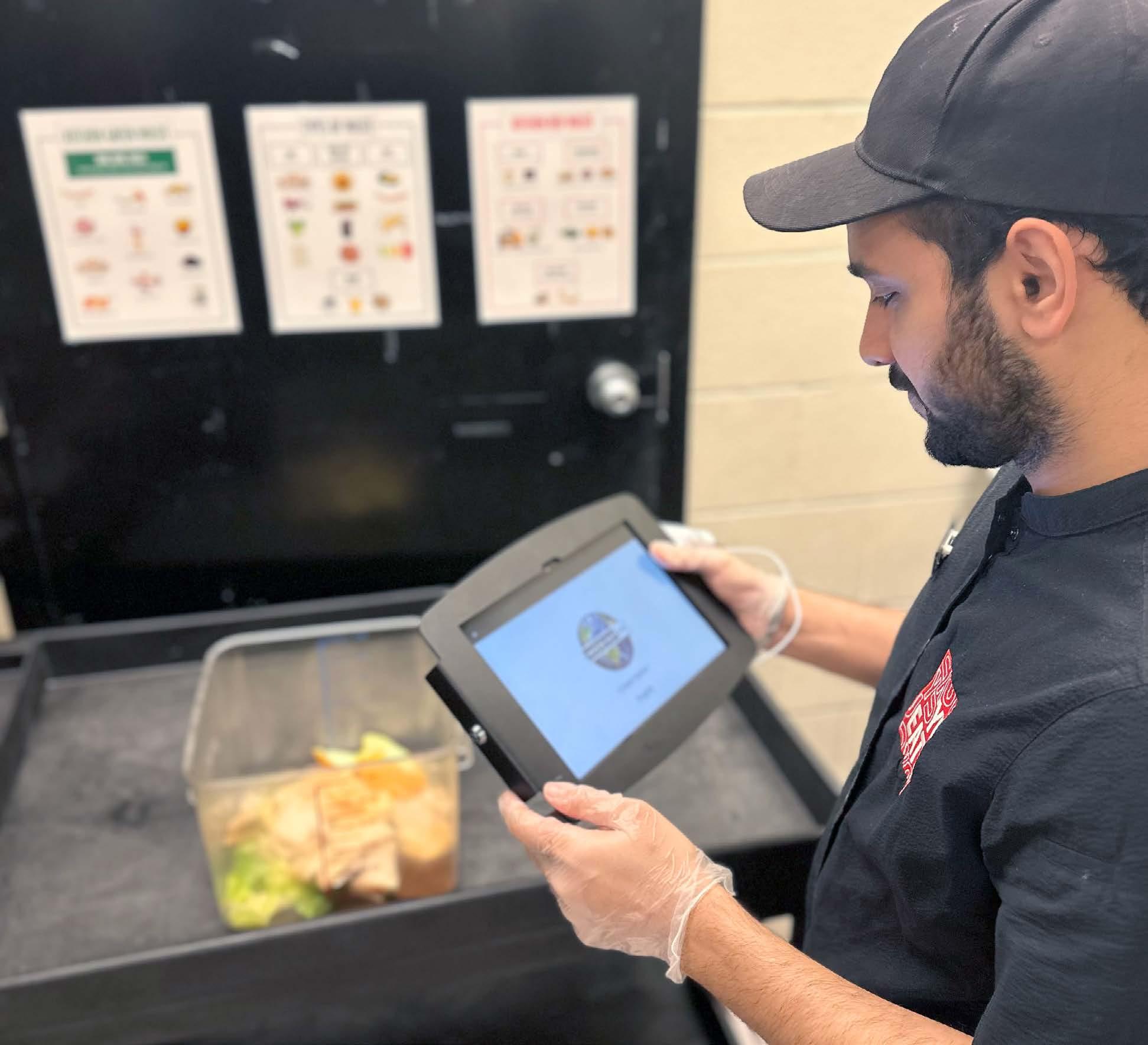
Did you know that 63% of the food Canadians throw away could have been eaten? That’s 140 kilograms of wasted food per year for the average household, at a cost of more than $1,300 annually, according to Love Food Hate Waste (LFHW) Canada, which works to reduce household food waste.
Across Canada, that amounts to almost 2.3 million tonnes of edible food wasted each year, costing us over $20 billion, reports LFHW Canada. To put that into perspective, it says every day we waste 2.6 million potatoes, 1.3 million tomatoes, 1.3 million apples, one million cups of milk, 650,000 loaves of bread, 640,000 bananas, 470,000 eggs and 130,000 heads of lettuce.
In 2021, we began working with Winnow, an AI tool that uses an in-depth analytics platform and reporting suite to track and measure food waste from our operations. We can now accurately pinpoint the largest areas of food waste and work to reduce those numbers significantly.
In the first six months of our partnership, we saw remarkable results from Milton Cook Chill, one of our Compass facilities in Milton, Ontario. Winnow helped us save more than $32,000, reduce our food waste by 18% and avoid 4.7 tonnes of CO2e gas emissions. As of October 2023, we have diverted 8 tonnes of waste from landfill and 34 tonnes of CO2e from the atmosphere.
In September 2022, we introduced a technology called ORCA, an innovative, clean, food waste solution. Simply using air, water and microbiology, ORCA turns food waste into an environmentally safe liquid that can drain into existing sanitary sewer infrastructure, which means the waste doesn’t have to be hauled to a processing plant or dumped in landfill.
Since then, this technology has reduced methane gas by 14.61 kg and CO2e GHGs by 19.78 tonnes.
Menuworks is our proprietary reporting tool for food waste prevention, menu planning and food consumption. This technology enables chefs and kitchen staff to control the amount of food waste being produced, manage how much of a particular ingredient to order and regulate the amount of food ultimately produced for consumption.
Menuworks helps our teams plan ahead and make real-time adjustments to menu preparation that more accurately represent customers’ tastes at a particular location. By considering the weight of leftover items at the end of a meal service, Menuworks provides a tangible value to that remaining food and allows chefs to review actual consumption and adjust ordering and preparation of ingredients for future menu planning.
For example, 30 blueberry muffins are baked and served at breakfast service, but only 12 are consumed. Noting this, the chef can go into the Menuworks database to adjust orders for eggs, flour and berries the next time blueberry muffins are scheduled. This cuts the amount of food wasted – and ultimately money spent – at individual locations and saves prep time by being more precise about what needs to be prepared for an individual foodservice.
Menuworks is designed to work in conjunction with Waste Not 2.0 as part of a kitchen’s daily operations to plan future menus and ensure the minimum amount of food is wasted.
Our annual Stop Food Waste day campaign is a day of action that raises awareness about the global issue of food waste while encouraging people to make small individual changes to reduce surplus food through food storage tips, meal planning and even digital food waste cookbooks. Leveraging our global size, scale and reach, in 2023 we inspired food waste warriors in every corner of the world, reaching a media audience of over 93 million people and generating more than 26 million impressions on social media. Our efforts are making an impact! We recognize the critical role we play in reducing our waste and educating on waste reduction.
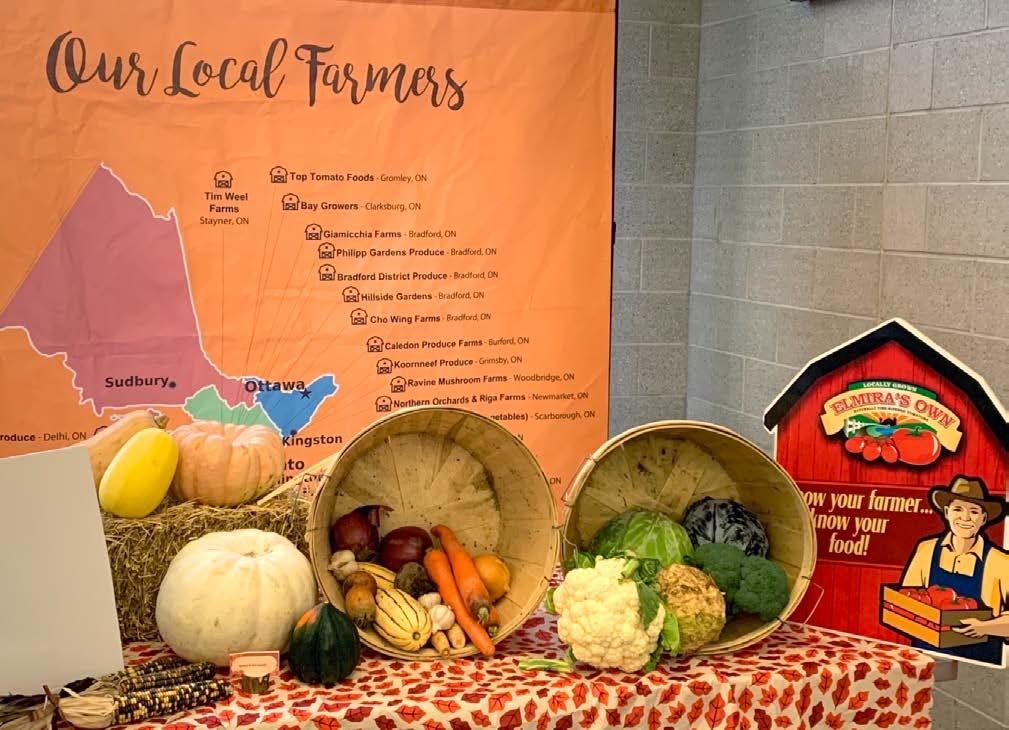
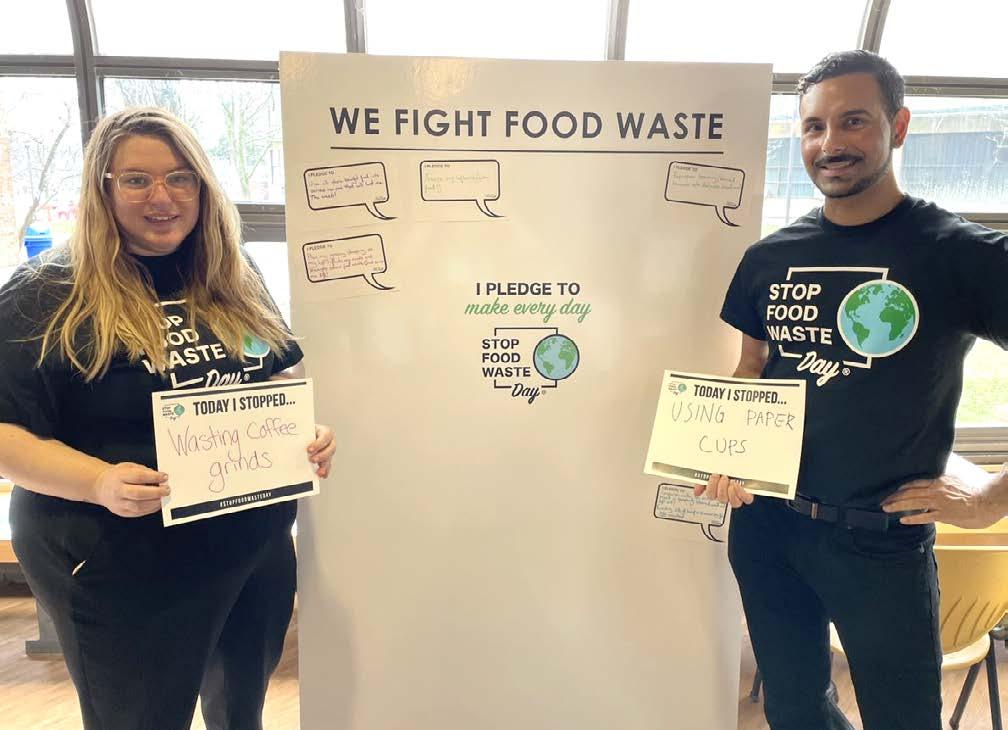
Our Stop Food Waste Day campaign is no doubt an important day, but we are focused on reducing food waste in our business EVERY day. Nobody wants to waste food, certainly not in the foodservice industry.”
Heather–
Wilkie, Executive Vice President, Business Transformation, Compass Group Canada
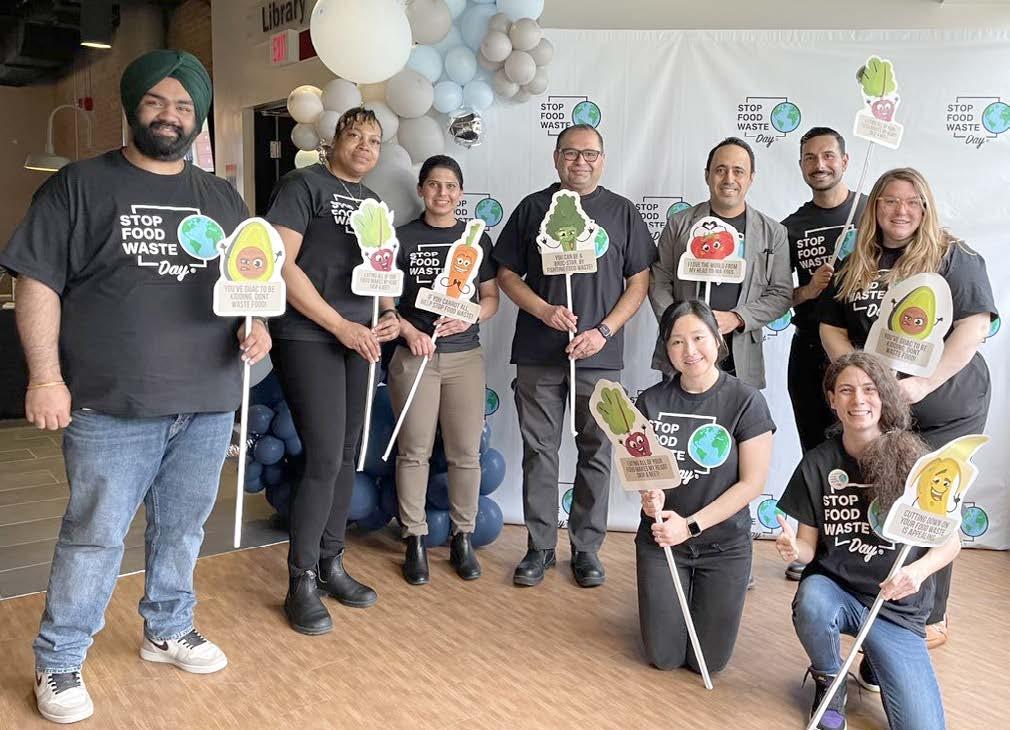
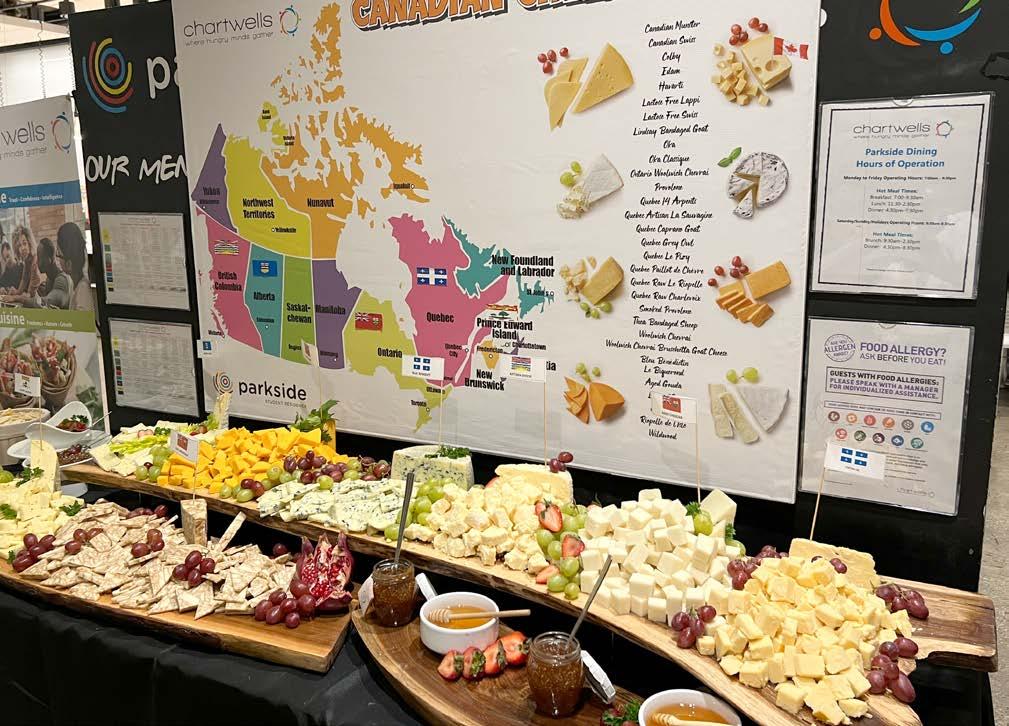
We spoke with Chef Kory about his experiences and experiments in creating delicious dishes from food that would otherwise be wasted.
In your own words, why is reducing food waste an important issue for your industry?
I’m passionate about food waste and how the small changes we can all make at home to reduce waste are possible. But the real impact comes from the changes we make in the industry. Since Compass is a global leader, it seems only fitting that we keep pushing the boundaries of what is possible and guide our team to invent new ways to reduce food waste. We serve hundreds of thousands of Canadians each year, so I think it’s our responsibility as chefs to think of ways to battle the issue by learning and implementing root-to-stem cooking and promoting things like regenerative farming practices.
What does reducing food waste mean to you?
There are financial benefits for consumers in cutting food waste. If you can find ways to use more of the food you buy, you can stretch your dollar while discovering some fantastic new recipes. There are, of course, the GHG reductions that come with reducing the amount of farming and transportation of goods, and by extending the usefulness of our ingredients, we consume less, which means more food available for everyone.
How do you develop your unique food waste recipes?
Inspiration comes from everywhere! Social media provides a lot of great ideas. I also go through old cookbooks because old-school cooking techniques used much more of everything and wasted very little. Once I have an idea, I need to get myself into the kitchen and get creative, tweaking and tasting until I achieve the product I’m looking for.
How are chefs today working to reduce food waste in Compass kitchens?
Thankfully, I work for a company that really cares about sustainability. Everyone from management to front-line servers is conscious of finding ways to conserve food. Waste Not 2.0 is a big part of this. Another tool at our disposal is our recipe database, Menuworks, which works by forecasting our recipes, so we only make enough food to get through the day with minimal leftovers. Batch cooking, meaning we cook in stages, is something else we stress in our kitchens. For example, we’ll make 25 portions of a stir-fry at a time even though we know we’ll ultimately need 200, so the freshest product is available during the entire lunch period. Then we can use any raw leftovers in another dish the next day.
On June 5, 2023, our very own Chef Kory appeared on Toronto’s Breakfast Television broadcast to share recipe ideas and promote unique ways to reuse food scraps and leftovers. He shared his top tips for creating delicious seasonings and meals to make the most out of food purchases while reducing waste. He also took the opportunity to promote our wonderful Stop Food Waste Day Cookbook, filled with ideas and inspiration from Compass chefs worldwide.

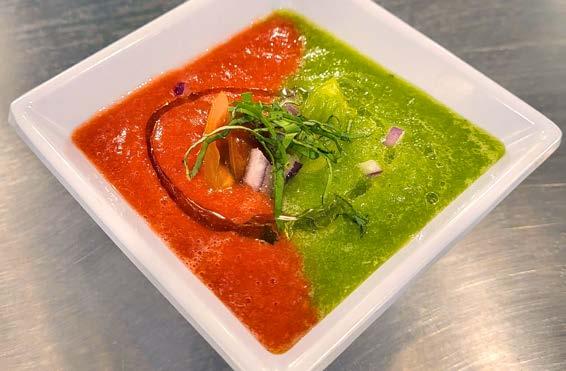

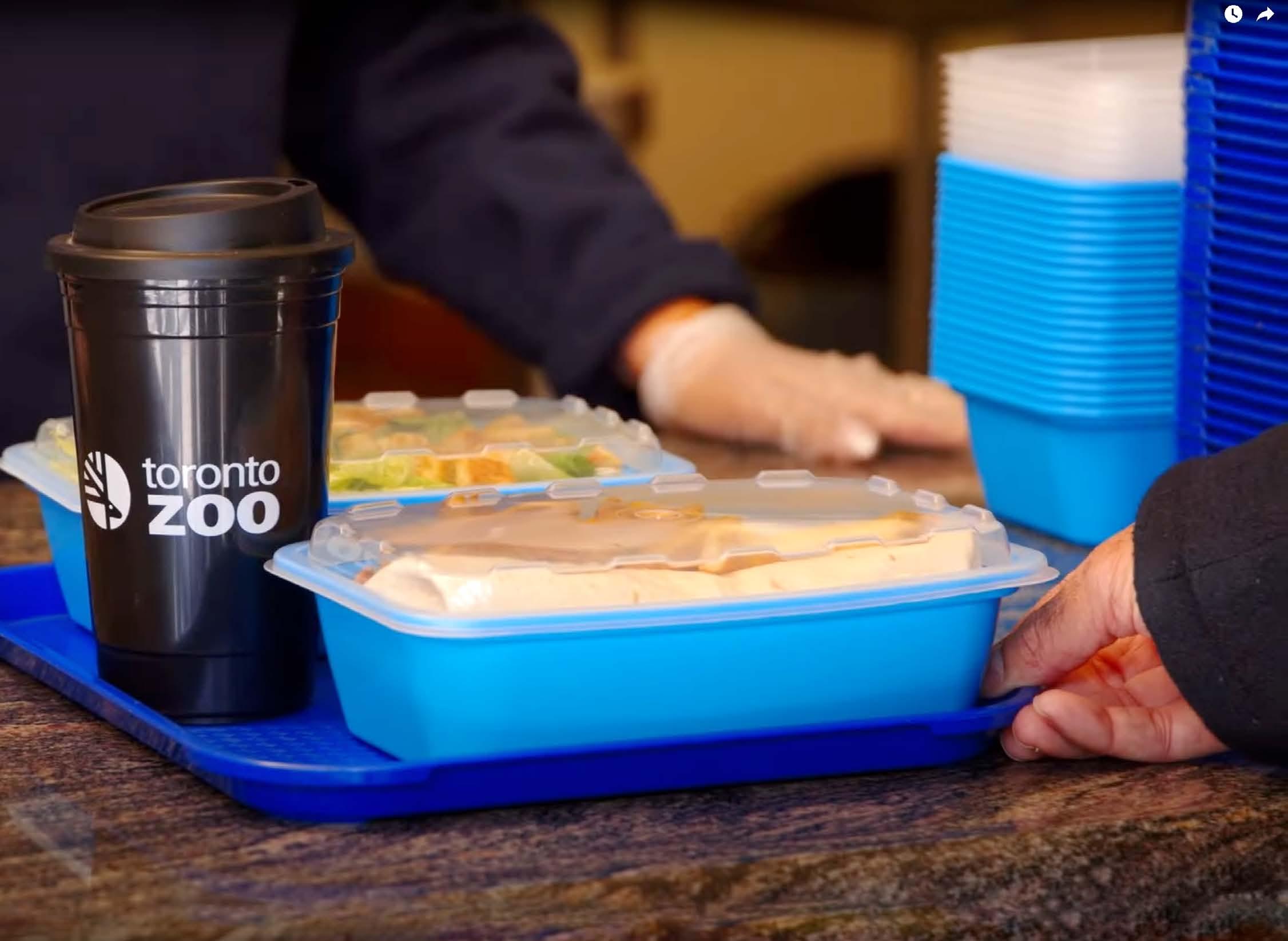
Reusable containers are a great way to reduce waste, especially at venues like the Toronto Zoo where single-use plastics are a concern. As the foodservice provider for the zoo for the past 24 years, we decided to partner with a company called Friendlier, whose range of reusable serving containers was the ideal solution. This initiative reduces the zoo’s reliance on single-use plastics while supporting our own Planet Promise and the zoo’s 2027 Net Zero goal of 100% waste diversion.
Friendlier’s sturdy serving containers are made using 24% less GHGs, versus traditional-use and disposal items. With over 131,000 meals served at the zoo each year, this new measure will significantly impact waste reduction efforts. We launched our pilot at the zoo’s Africa restaurant in the summer of 2023 and plan to roll out these reusable containers to more park restaurants in the future.
A Canadian, female-founded business, Friendlier has been in the market since 2020. The company launched its reusable containers through a handful of restaurants in the Guelph area and now works with large-scale operations across southern Ontario, Montreal and Vancouver. Its products are designed to be reused safely, resulting in a significant decrease in the use of single-serve products within the foodservice and takeout environments.
At the zoo, containers require a $0.50 deposit, and customers can choose to receive their deposit refund through the Friendlier mobile app or donate their deposit to the Toronto Zoo Wildlife Conservancy to support wildlife and the wellbeing of animals. Containers are collected, cleaned, sanitized and redeployed to the market by Friendlier.
With the launch of this environmentally friendly, circular reusable system, visitors to the Toronto Zoo can enjoy their food while knowing they are contributing to a more sustainable future.
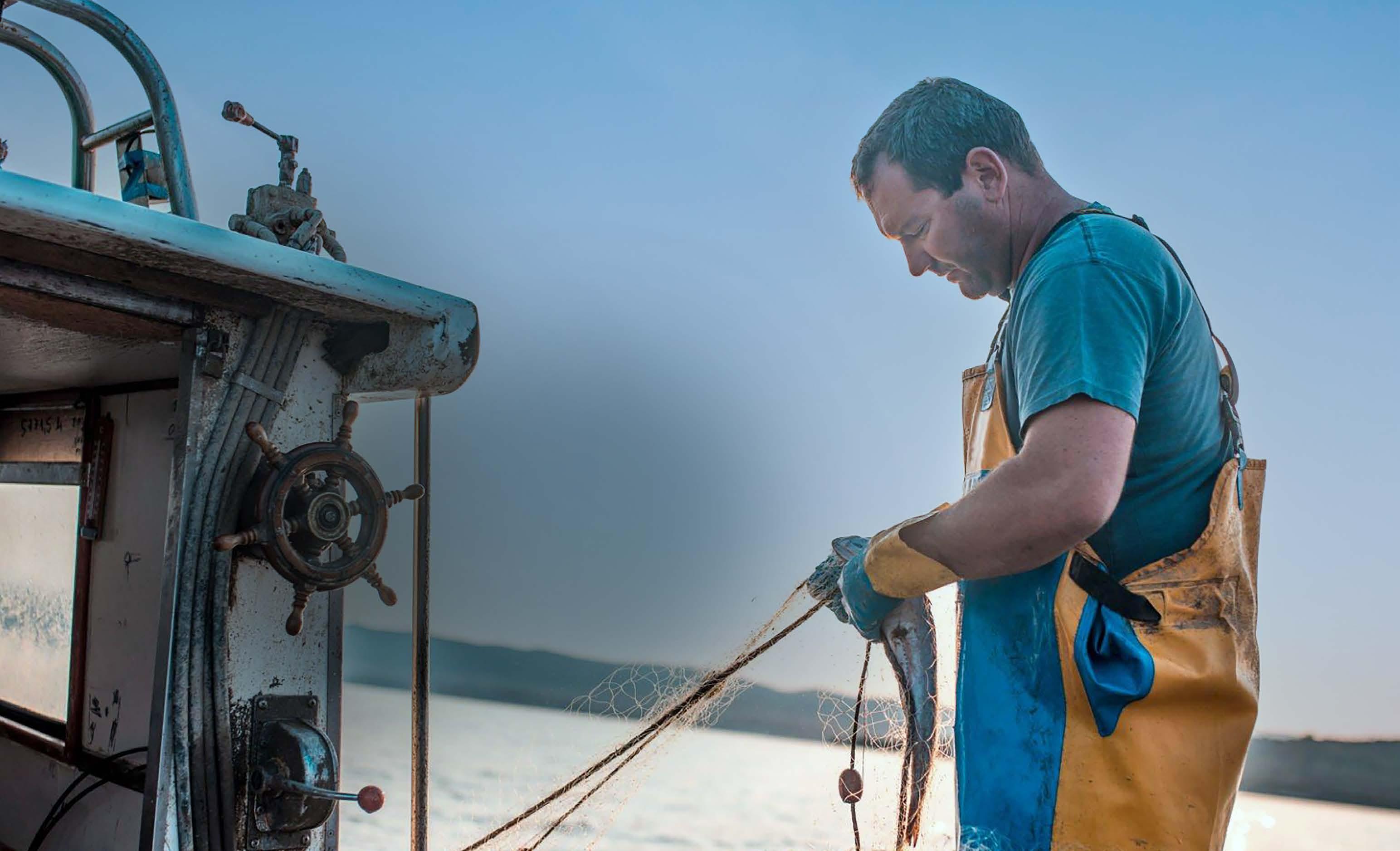
What factors make a commodity high risk, and why are these important to identify?
Farmers are under tremendous pressure due to a shortage of suitable land for expansion, increasing demand, lack of financing, fluctuating prices and challenges from changing weather conditions. Highrisk commodities generate some of the world’s highest impacts on water, energy, labour, biodiversity and climate. Identifying high-risk commodities in our supply chain allows us to set responsible sourcing policies to help mitigate the largest risks to our business. It also allows us to contribute to shaping more responsible agricultural practices and send a signal to industry demanding sustainable supply in high-impact sectors.
Having a safe and sustainable supply chain is vital to delivering quality to our customers and clients. We work with our suppliers to help meet our responsible sourcing standards and goals. Compass has implemented industry-leading standards that set the benchmark for performance when it comes to purchasing and supply chain practices. Our global Supply Chain Integrity Standards set out the minimum sourcing requirements to minimize key risks to the integrity of our supply chain. We review and update these standards regularly so we can assure our customers that the food we provide is safe, wholesome and responsibly sourced. We have also set key targets for specific ingredients and have started making progress toward our goals. As one example, we have successfully shifted over 60% of our whole liquid egg products to cage-free and have begun transitioning to liquid whites and scrambled egg products from free-range chickens.
100 % of our shell eggs and liquid egg products to be cage-free by 2025
2023 PROGRESS
36 % of our eggs were cage-free
100 % of the palm oil used in our kitchens to be certified sustainable
2023 PROGRESS
100 % of the palm oil used in our kitchens was certified sustainable
Over 50% of our seafood to be certified sustainable
The world’s oceans are the source of life for hundreds of thousands of species and are vital to the survival of our planet. Unfortunately, between climate change, pollution, plastics and rampant overfishing, our oceans are at risk as an ecosystem and a sustainable food source for millions of people. For our part, Compass now sustainably sources over 50% of our seafood.
We have also partnered with the Global Sustainable Seafood Initiative, a public–private partnership helping to preserve our oceans for future generations and drive forward the need for sustainable seafood.
Oil palms are highly efficient producers of high-quality, versatile oils, but they only grow in the tropics, where their cultivation can negatively impact the environment. Compass fully supports the work of the Roundtable on Sustainable Palm Oil (RSPO), which promotes the growth and use of sustainable palm oil products, and we actively encourage our key suppliers to do likewise. We have set out a commitment to achieve transparency on the palm oil that is used in our kitchens to prepare food and we achieved 100% sustainable palm oil from our supply chains in 2022.
2023 PROGRESS
62% of our seafood was certified sustainable
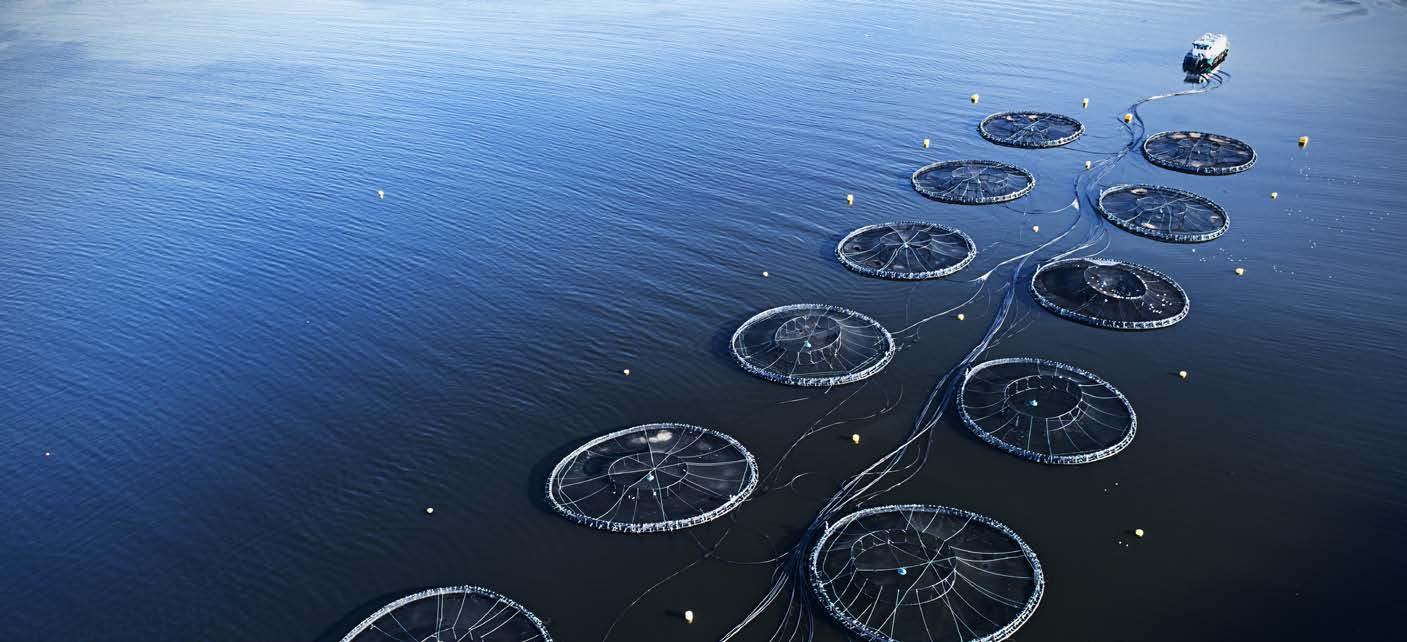
Improving animal welfare and shifting toward more sustainable animal agriculture is a key component of our approach to responsible sourcing around the global level. Our strategy includes our ongoing efforts to increase the visibility of our complex supply chain, allowing Compass Group companies to make better-informed procurement decisions.
As an absolute minimum, products derived from animals must follow all applicable legislation relating to animal welfare in the country of production and/or purchase.
We also endorse the Five Freedoms of animal welfare:
Freedom from hunger and thirst
Freedom from pain, injury or disease
Freedom from fear and distress
Freedom from discomfort
Freedom to express normal behaviour
Over the past year, Compass Group has improved transparency on our animal welfare targets, progress and actions and shared more detailed updates and case studies. For example, this year we published a global update on our progress and transparency regarding our transition to cage-free egg sourcing, which was recognized by Mercy for Animals in its International Cage-Free Equity Index, where we received a top ranking for openly reporting our global cage-free egg progress for all regions of operation. We continue to make great progress on our cage-free egg commitment, despite recent headwinds such as avian flu and availability of supply. In Canada, we are on track to achieve our goal of sourcing 100% cage-free shell and liquid eggs by 2025.
We recognize that collaboration across our supply chain is essential for making meaningful change, which is why we work closely with our suppliers, partners and industry organizations to develop and enhance our animal welfare standards and our approach to drive change. We have direct and open conversations with animal welfare organizations as we work toward common goals. In Canada, we have partnered with the Humane Society International to deliver plant-based training programs to our chefs to increase education and awareness and inspire culinary innovation in vegan dining.
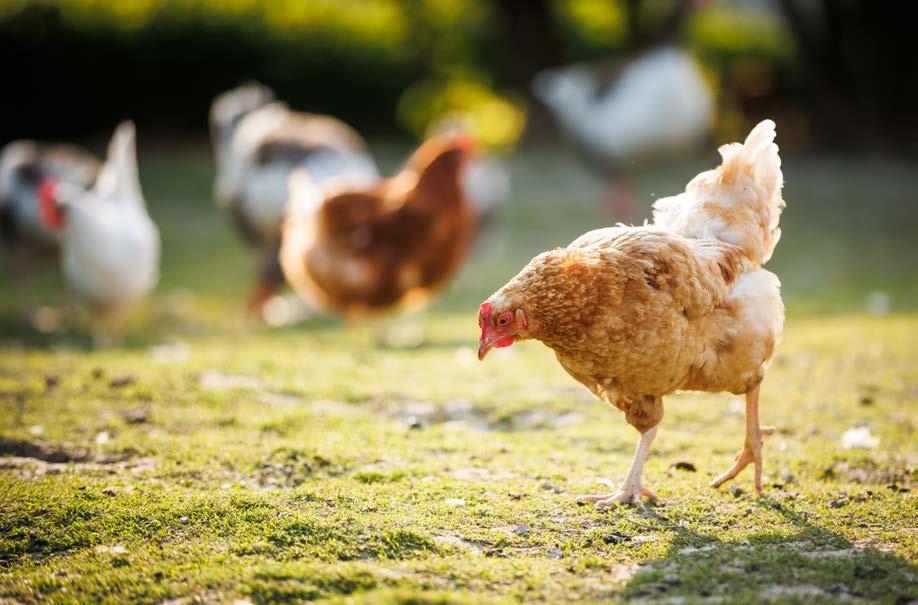

As a culinary concept that celebrates plant-based foods, Plantiful is great for both the body and the planet. This style of cuisine emphasizes a variety of plant-based ingredients, including fruits and vegetables, whole grains, beans and legumes, nuts, seeds, herbs and spices.
Inspired by the highly popular plant-forward movement, our Plantiful recipes were created in collaboration with Compass Group Canada’s Executive Chef Sean Sloan and the world-renowned Chef Paul Boehmer, whose skills and expertise have been featured in several publications such as Toronto Life and the Globe and Mail. He has also mentored numerous apprentices from across the globe and is passing on his knowledge and preparing the next generation of highly skilled chefs in Toronto.
Chef Paul opened Böhmer Restaurant in early 2010. As chef and owner, he continues the culinary traditions of his early career, offering affordable upscale dishes featuring locally grown and harvested Canadian ingredients, which is what the concept of Plantiful is based around.
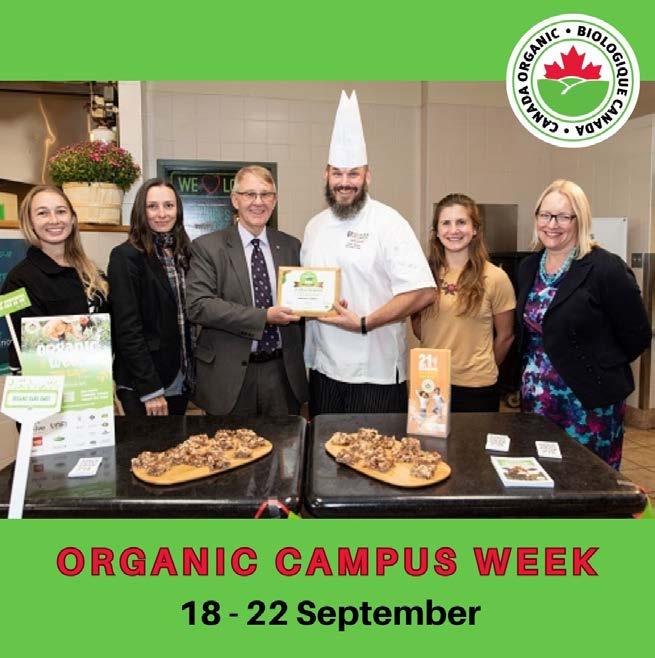

When the vast majority of the people you serve belong to the largest consumer group of organic products (18- to 24-year-olds), that’s an incentive to become certified as the first organic campus in Canada. Acadia University in Nova Scotia proudly achieved this designation from the Canada Organic Trade Association in 2022 and continues to provide and promote organic foods to its community.
To qualify, a campus must not only carry a minimum of five organic products but also offer organic educational resources and establish a steering committee made up of students, staff and faculty to oversee procurement. In addition, Acadia University has been working to engage students and staff through various activities during its last two Organic Campus Week events in 2022 and 2023, including providing nutrition education and featuring a range of local organic products from farms in the area. The program is led by the Acadia Sustainability Office in partnership with campus foodservice providers.
Since being named a Fair Trade Campus in 2012, Simon Fraser University (SFU) has been continuously working with its partners – including Compass subsidiary Chartwells – to become the model for fair trade foodservices on campuses in Canada. On October 1, 2020, SFU achieved that goal by becoming the first educational institution in Canada to be awarded the Fair Trade Gold Campus status by Fairtrade Canada and the Canadian Fair Trade Network. SFU changed its procurement policies, committing to serving fair trade products like tea, coffee, bananas and chocolate on campus, all thanks to a dedicated group of students looking to make a real change in where their food comes from. SFU has used this as a springboard to further its commitment to helping farmers and other workers in the Global South by educating others at the University Highlands Elementary School, the Point Church and the SFU Childcare Society on what they can do to promote and engage in fair trade. SFU remains today as the only Canadian campus to have attained the Gold designation, the highest level within the Fair Trade Campus program.
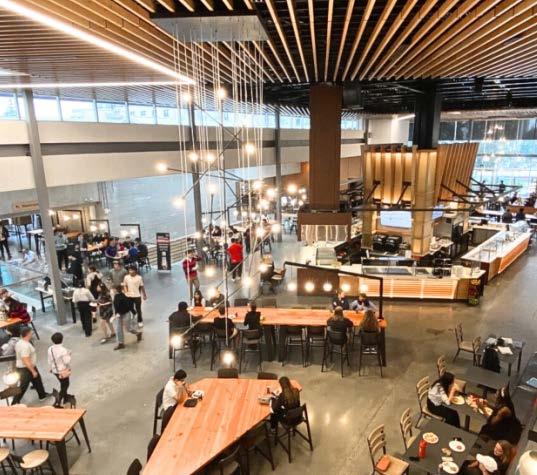
Our partnership with Chartwells at SFU has been instrumental in attaining the esteemed Fair Trade Gold Campus status, exemplifying our ongoing commitment to social justice, ethical sourcing and supporting farmers and producers in the Global South.”
– Mark Mclaughlin, Chief Commercial Services Officer, Ancillary Services, Simon Fraser University
Offering well-balanced meals and snacks means both finding and providing fresh, wholesome ingredients. Because sustainability is always top of mind, we source locally and seasonally to meet the needs of our customers. Our commitment to the planet helps sustain animal, plant and aquatic life and minimizes the environmental impact the transportation of goods can have on the planet.
To prioritize sourcing local and seasonal foods, we partner with Foodbuy, the largest foodservice procurement organization in North America. By working with small local growers, Foodbuy helps realize savings and efficiencies by aggregating purchasing volume and using that leverage to negotiate prices with manufacturers, distributors and other local vendors.
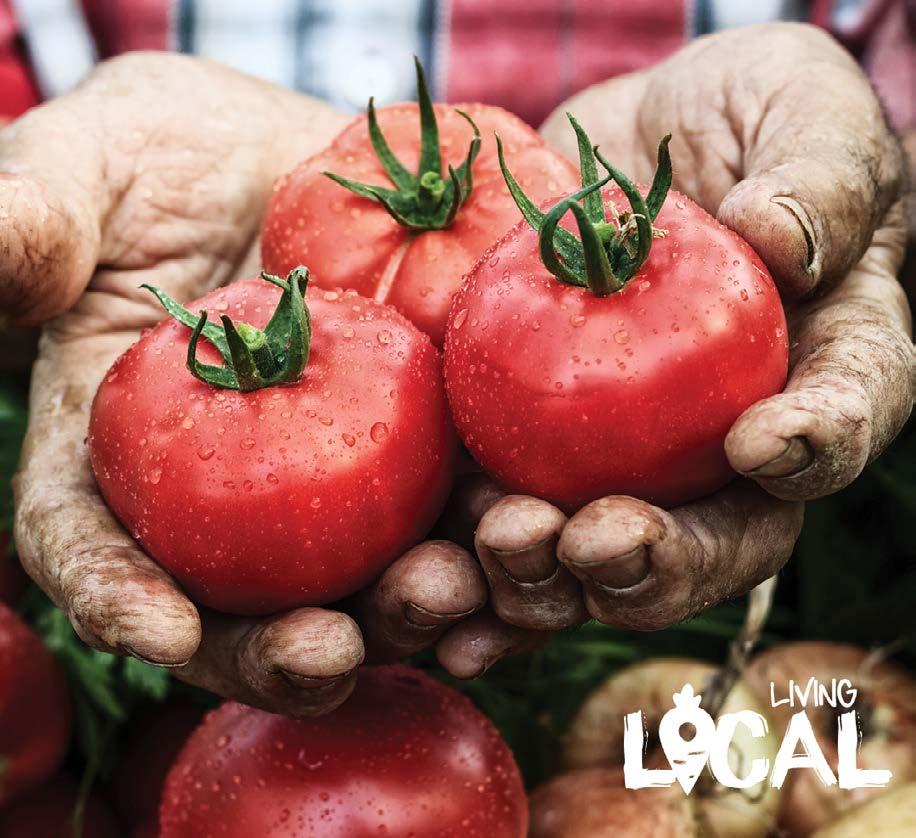
Supporting our local communities is important to us and to our clients. As part of our commitment to sustainability and the economic development of local producers, we have the Buy Local program – our solution for safely sourcing from the farmers and vendors in our communities and bringing their great products to our kitchens, cafés and dining spaces.
With the Buy Local program, our chefs can invite small local farmers and food manufacturers to complete a simple and efficient food safety approval process, and then chefs can begin sourcing directly from these local suppliers.
We evaluate all our suppliers and partners to ensure they align with our beliefs and the way we conduct our business while providing social value to our communities.
One-fifth of our products are sourced directly from a diverse selection of over 150 suppliers.
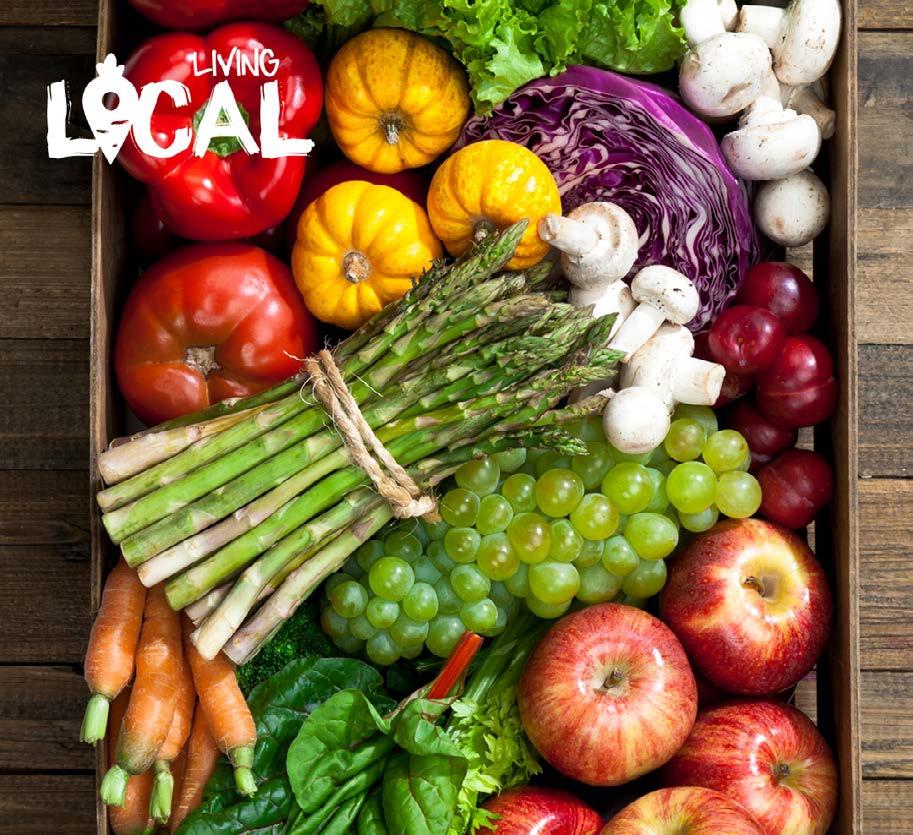
We openly promote and publish our stand on issues such as modern slavery, child labour practices, forced labour and human rights abuses. Everyone is welcome to visit our website to read our Global Supplier Code of Conduct and our Modern Slavery Act Statement to learn more about our labour practices and supplier requirements. In addition to clearly setting out the ethical standards that our people, clients, investors, suppliers and local communities can expect when they work with us, we are unwavering in our commitment to human rights, with a particular focus on vulnerable groups, and emphasize our zero-tolerance policy for forced and child labour.
We are also working to measure, report and set targets for increased sourcing from social enterprises and businesses owned and operated by women, LGBTQ+, and Black, Indigenous and other people of colour (BIPOC) to create a database of suppliers that meet our diversity definition and certification.
In addition, we launched our participation in the Supplier Ethical Data Exchange (Sedex) to ensure human rights and ethical trade throughout our supply chain. Sedex’s mission is to supply data-driven insights, tools and services to help companies consistently improve their ethical performance.
To make sure we’re in line with humane and ethical practices, our Foodbuy procurement team partners with various organizations representing under-represented groups to increase our social procurement spend. This includes organizations such as Canada’s 2SLGBTQI+ Chamber of Commerce (CGLCC), the only chamber of commerce uniting and advocating for over 100,000 2SLGBTQI+ owned and operated businesses, and Women Business Enterprises Canada (WBE Canada), a non-profit helping Canadian women-owned businesses access business supply chains across North America. We cover our policies around these practices in our Supply Chain Integrity Policy Statement.
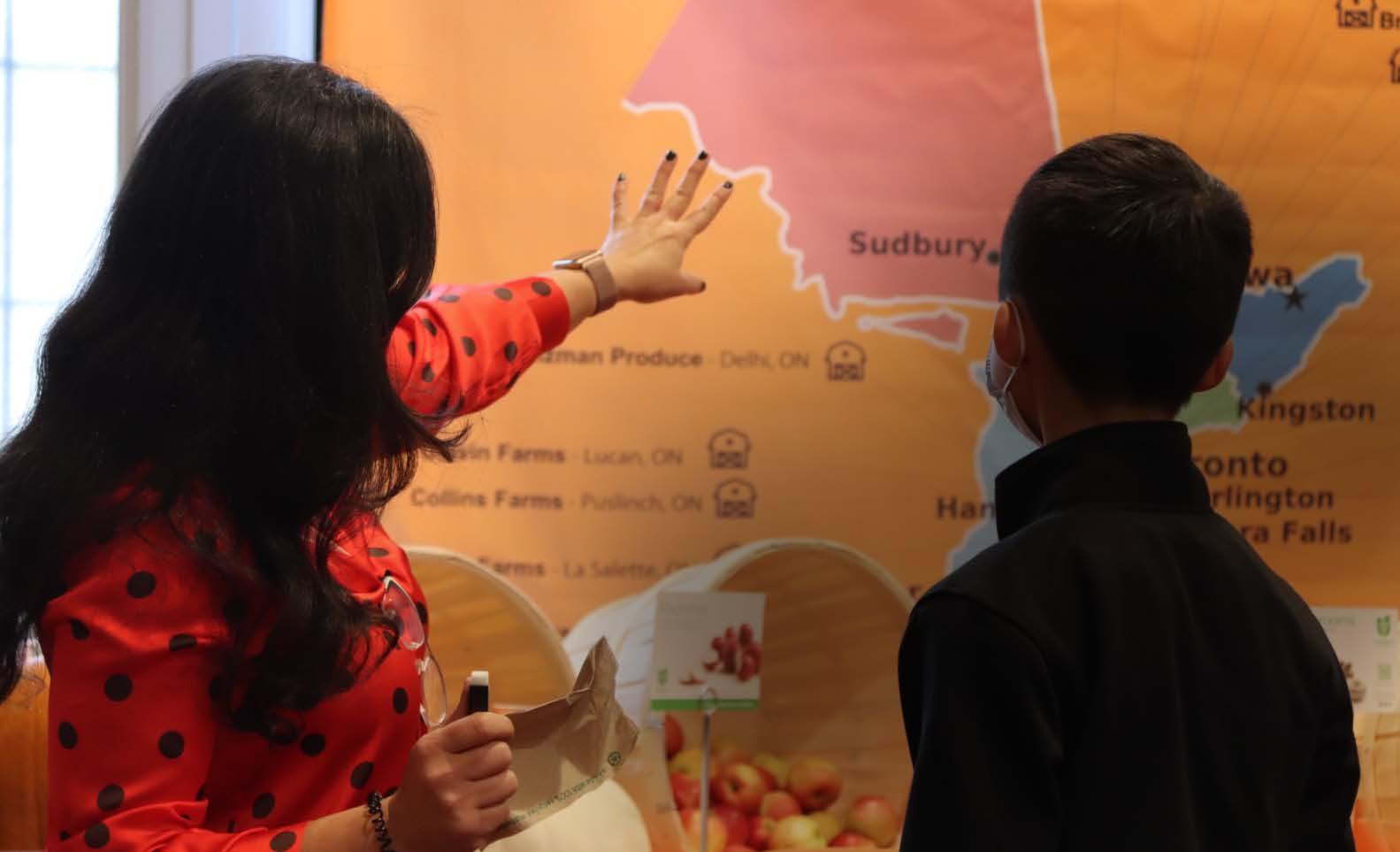
How does supporting the community align with Compass Group Canada’s sustainability goals?
Sustainability maintains and enhances the health of our planet, and in many cases also has societal benefits. Sustainability promotes a stronger economy, minimizes waste and pollution, reduces emissions and enhances the livelihoods of those in our communities.
Brought to life in 2017, Chefs Hall is the ideal platform for up-and-coming chefs and seasoned restauranteurs alike. Located in the heart of Toronto’s financial district, Chefs Hall provides an open space for chefs to showcase their work, offering local talent an opportunity to present their skills. Chefs Hall features a broad range of culinary experiences in one venue, giving diners a unique food experience while allowing chefs to grow their expertise.
Compass purchased the majority stake in Chefs Hall in late 2019 with the specific intent to give back to the community by helping young and talented chefs get their first taste of running their own businesses.
The chefs at Chefs Hall make it a point to focus on local and sustainable ingredients, and they launched Waste Not 2.0 in May 2023. Since then, they have seen a significant improvement in waste management and repurposing of what would have been considered food waste into usable ingredients in new and delicious meals. As of December 2023, Chefs Hall moved all single-use plastics to biodegradable products for takeout containers and bamboo for cutlery.
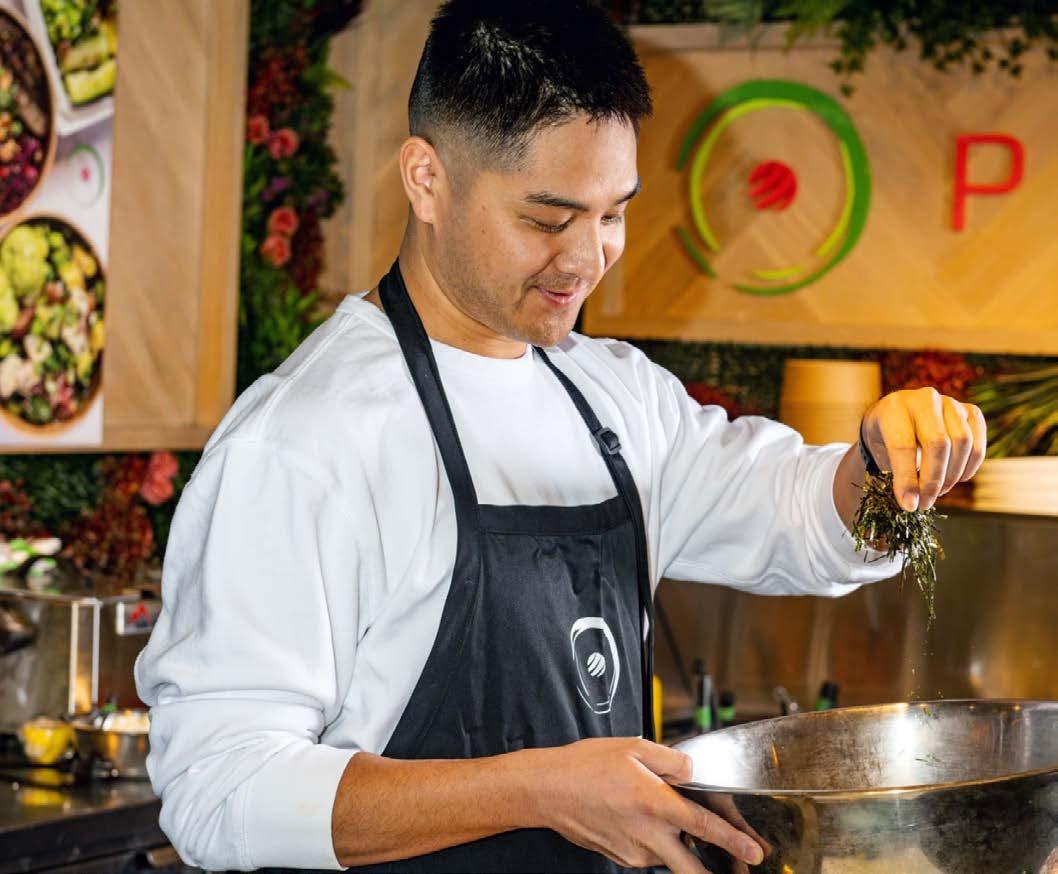
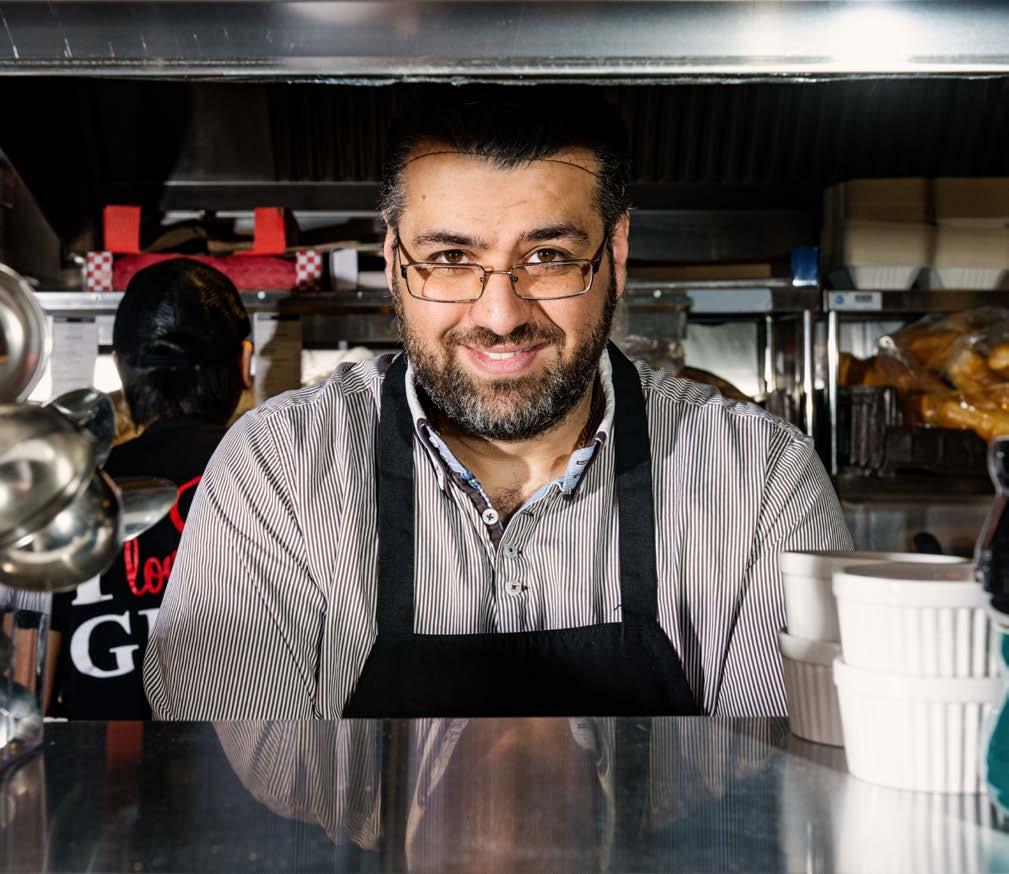




Working to break the stereotype of unappetizing, flavourless hospital food, Compass One, our healthcare division, has developed a revolutionary food program called Comfort Kitchen. Aimed at improving the patient experience by providing warmth and hospitality along with nutritious and delicious meals, Comfort Kitchen offers a dining experience that gives patients choice at every meal period. Patients are greeted by a nutrition associate who will review and walk them through their menu selections – ensuring their meal is what they want and made just for them.
Comfort Kitchen gives patients variety and flexibility in their menu selections, helping to improve overall consumption and nutrition intake. Using fresh, wholesome ingredients, meals are made onsite and offer familiar flavours to stimulate the appetite.
It takes artistry, innovation and passion to create food that brings our patients to a place where they feel like they are enjoying the comforts of home.”
– Breanne Coulton, Executive Chef, Patient Dining & Innovation, Compass One Healthcare
We employ a flexible web-based guest feedback solution that provides actionable input from our customer locations. Foodback allows us to track and measure the voice of our customers in real time. This enables us to continuously enhance our sustainability programs and offerings while driving satisfaction for our guests – all based directly on their feedback.
Foodback is used to measure overall guest experience and our performance in four categories: food; service; sustainability and wellness; and a custom category that varies by sector and location. The chart below highlights our sustainability and wellness results that include an average 10% increase in guest satisfaction year over year.
April –December 2022 January –October 2023
Foodback YOY Sustainability Results1
How satisfied are you with the café’s efforts to reduce package waste
How satisfied are you with the availability of locally soured items
How satisfied are you with the variety of plant-based options
How satisfied are you with the variety of healthy options
1 Scoring is based on a rating scale of 1 to 6 for each question. Base = 32,539 Foodbacks (11,920 Chartwells; 6,625 Chartwells K-12; 4,682 healthcare; and 9,312 Eurest).
Such a well-run, clean and organized cafeteria. I appreciate the variety of healthy options. The spicy chicken wrap was delicious!”
– South Health Campus, Calgary, Alberta
This is the best there could be and surely deserves popularization, given that they provide healthy choices that encourage wellness and balanced body and mind. I truly recommend that students and staff who embrace being healthy and eating well try this cafeteria outlet in the Stong Building. The staff are friendly and helpful too.”
– York University, Toronto, Ontario
Great selection of healthy foods and something for everyone to enjoy.”
– Carbonear General Hospital, Carbonear, Newfoundland and Labrador
Though we carefully plan and monitor our food use in Compass kitchens, there is frequently nutritious and delicious food left over that should not go to waste. That’s why Compass kitchens are part of food recovery programs that not only keep good food from going into landfill but also help us maximize our community outreach efforts by supporting local organizations that provide meals to those living with food insecurity. One such organization is Quebec-based La Tablée des Chefs.
La Tablée des Chefs, founded in 2002, acts as a liaison between food donors and community organizations. Each year, it works with more than 200 donors who have donated over two million meals to nearly 200 organizations. Compass, as one of these donors, has implemented a clear process in our kitchens that motivates our associates to participate.
For example, our kitchen team at the Bell Centre in Montreal has supplied surplus food to La Tablée des Chefs since 2007. After each game or event, our team works together to collect surplus food packages and label containers for pickup by local community partners. But that’s not all! The Bell Centre team was active during the pandemic, preparing meals for food banks as part of La Tablée des Chefs’ Solidarity Kitchens initiative. In 2020, the team made over 50,000 meals for Indigenous communities, while in 2021, it prepared nearly 30,000 meals for local food banks.
Social impact:
Over 78,500 servings
Additionally, our associates at the Bell Centre participated in another initiative, Solidarity Baskets, a fundraising effort launched to support various La Tablée des Chefs’ programs during the pandemic. The team continues to engage, currently supporting the Solidarity Soups program by providing surplus vegetables to prepare healthy and delicious soups for elementary school students living with food insecurity – all while ensuring we reduce food waste and minimize our impact on the environment.
Environmental impact:
Over 23,500 kilograms of food saved
The Food and Agriculture Organization (FAO), a specialized agency of the UN that leads international efforts to defeat hunger, defines food security as when “all people, at all times, have physical and economic access to sufficient, safe and nutritious food to meet their dietary needs and food preferences for an active and healthy life.”
As one of the world’s largest food suppliers, we are ideally positioned to impact change in ensuring food security for all. This is why it makes sense to focus our energy on the second SDG, Zero Hunger. We want to help achieve this goal and help our local communities tackle food insecurity by donating surplus food to people in need through partnerships with local charities and organizations.
In 2023, we donated over 23,000 monthly meals in partnership with 120 non-profits nationwide.

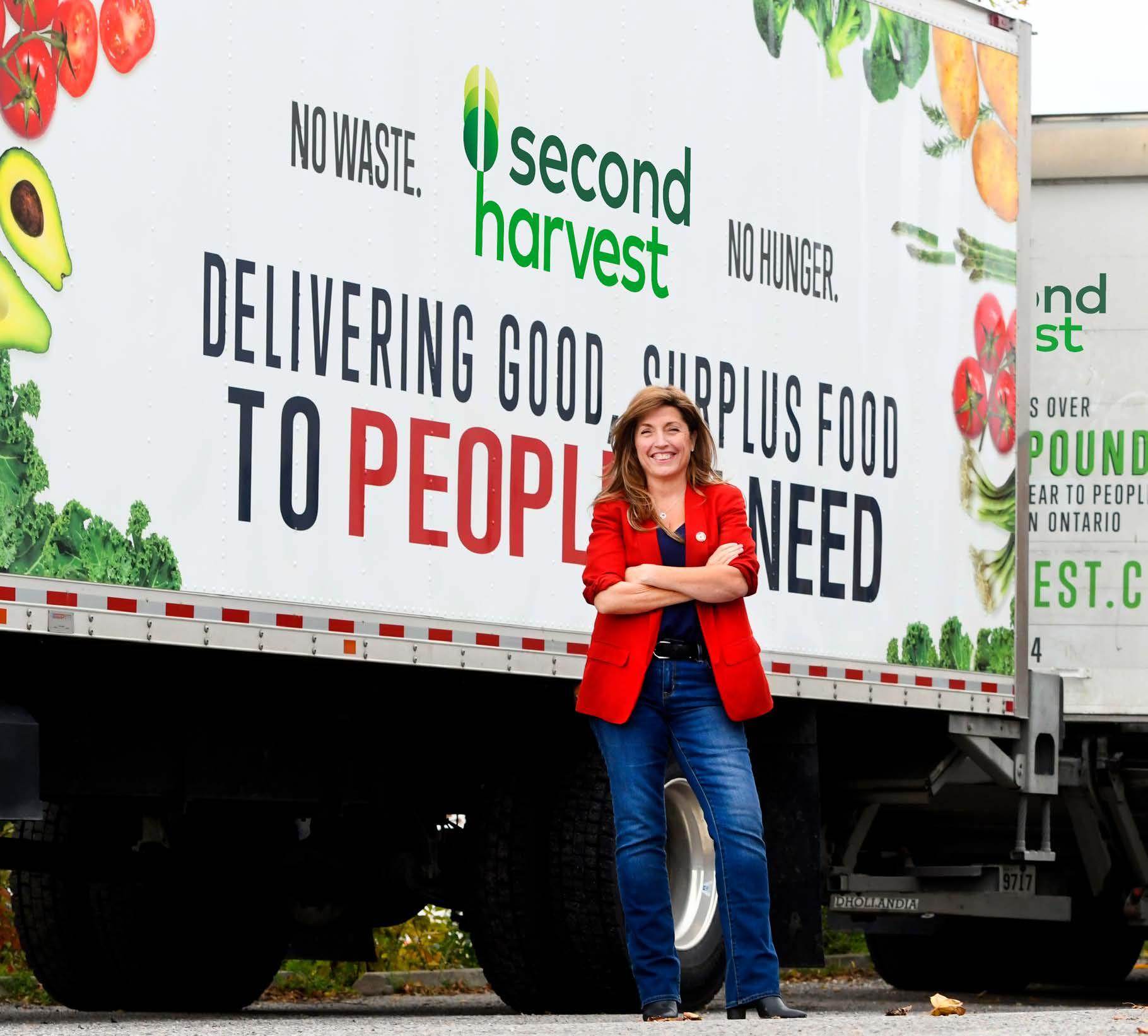
No waste. No hunger. That is the mantra of Second Harvest, a Canadian charitable organization working hard to end food insecurity through its food recovery network. This program partners with corporations with excess food to donate and other community non-profits focusing on feeding those in need while at the same time reducing the amount of good food being wasted.
Through our partnership with Second Harvest, we make sure that good, safe, surplus food ends up on dinner plates rather than in landfill.
Compass began our partnership with Second Harvest in December of 2018 when we made a food donation from our kitchen at the RBC Waterpark Place Auditorium in Toronto. Since then, more than 100 of our locations have donated 450,000 meals to Second Harvest, feeding those with food insecurity.
Organizations supported by this initiative are from all across the country. They include the Dowling Community Service Residence in Toronto, a non-profit offering support programs, including a residential program for homeless people living with mental health challenges, where we provide prepared meals, baked goods and salads for its outreach meal program. “All the prepared meals, baked goods and salads are superior in food quality, and are safely maintained, sealed and fresh,” says Leah White, Foodservice Coordinator at Second Harvest. “And all the associates are super friendly and helpful.”
In New Westminster, the Seniors Services Society of B.C. provides programs and services in support of at-risk seniors, and we provide weekly donations of healthy prepared salads, fruits and vegetables, and delectable baked goods. “Every Friday feels like Christmas,” adds Leah. “The food always contains nutritionally dense, healthy prepared salads, fruits and vegetables. And the pastries are to die for! They’re always fresh and always enjoyed by our clients. We feel extremely blessed to be affiliated with Compass.”

We can’t achieve our goals in isolation. As part of a global organization, Compass Group Canada works closely with our colleagues around the world to share insights and achievements. Sharing thoughts and ideas helps us collaborate and find global solutions to sustainability issues. Group members are individual countries with unique cultures, traditions and foods. But we share a common desire to help our planet and its people find food security while maintaining an environmental balance. With dedication and the determination to change, we can make good on our Planet Promise.
We believe that we can indeed make a difference. We believe our global commitments are achievable and that we can become carbon neutral worldwide by 2030 and achieve Climate Net Zero by 2050. Reducing GHGs, improving the lives of farm animals and transitioning to more plant-based diets is possible, and if we all work together, we see a bright future for our planet.
We provide world-class hospitality to millions of people every day. It’s what we value and what we’re great at.
We operate at thousands of client locations across Canada, from hospitals, schools and remote sites to corporate headquarters and some of the country’s largest entertainment venues. We can also support our clients beyond food with a range of soft services – consistently and costeffectively delivered to the high standard we are known for.
We have a passion for great food and great service. Every one of our clients has a unique understanding of the role food should play in their environments. We offer warm hospitality, excellent service and flair – at every type and size of location. Our expertise allows us to deliver the best value in the market, meeting and even exceeding our customers’ expectations.
We take great pleasure in seeing how our food brings people together. It’s our motivation and keeps us on point, so we are encouraged to consistently deliver the best and most efficient foodservice for every one of our clients. We always search for the freshest, most innovative ideas with the help of our expert chefs, who share our passion and commitment to exceptional foodservice.
From professional facilities management to efficient custodial cleaning, we provide a comprehensive range of support services.
Our clients’ reputations rest on their trust in us to deliver superior cleanliness and sustainability in our facility management capabilities. Our environmental services are available across various sectors, including business and industry, public and private education, healthcare, leisure and entertainment, remote sites and more.
We have industry-leading purchasing power to optimize your business.
Our procurement is managed through Foodbuy, providing efficiencies and economies of scale that are simply unmatched. Through our family of trusted partners, Compass is focused on sourcing the right products and solutions that are efficient and economical. Working with sustainability-focused suppliers, we achieve our own environmental and social goals while meeting our standards of excellence.
Our mission is to create extraordinary experiences at the intersection of hospitality and technology.
We build, deliver and scale end-to-end solutions for customers and operators. We bring our products and technologies to market backed by teams of experts, adding value as we use digital tools to transform our processes.
Compass Digital works with more than 280,000 associates and serves over 11 million meals daily. Our digital experts build and deliver leading-edge products and technologies. Constantly on the lookout for the next big innovation, our team takes risks and is always willing to try out new ideas and experiment to ensure we are on the cutting edge.

We deliver world-class hospitality in every environment, from coast to coast to coast.
We have a unique portfolio of brands that are designed to reflect the markets we operate in. Each distinct sector gives us the tools we need to get closer to our clients so we can understand their specific needs and meet their expectations:






Our sustainability strategy aligns with our Planet Promise goals, with reporting playing a fundamental role in disclosing progress toward our global commitments in a transparent manner. The results of our ESG reporting allow us to stay on track toward our 2030 milestones on our journey to becoming net zero in 2050. Results are released annually for investors, clients, suppliers, associates and other stakeholders. The table below highlights our FY23 results.
1 Better nutrition is defined as having at least one healthy meal choice available for each meal period.

Compass Group Canada
1 Prologis Blvd, Suite 400
Mississauga, ON
L5W 0G2
Canada
Contact Us:
CGC.Sustainability@compass-canada.com
800.465.2203
compass-canada.com
Concept and Design: worksdesign.com
